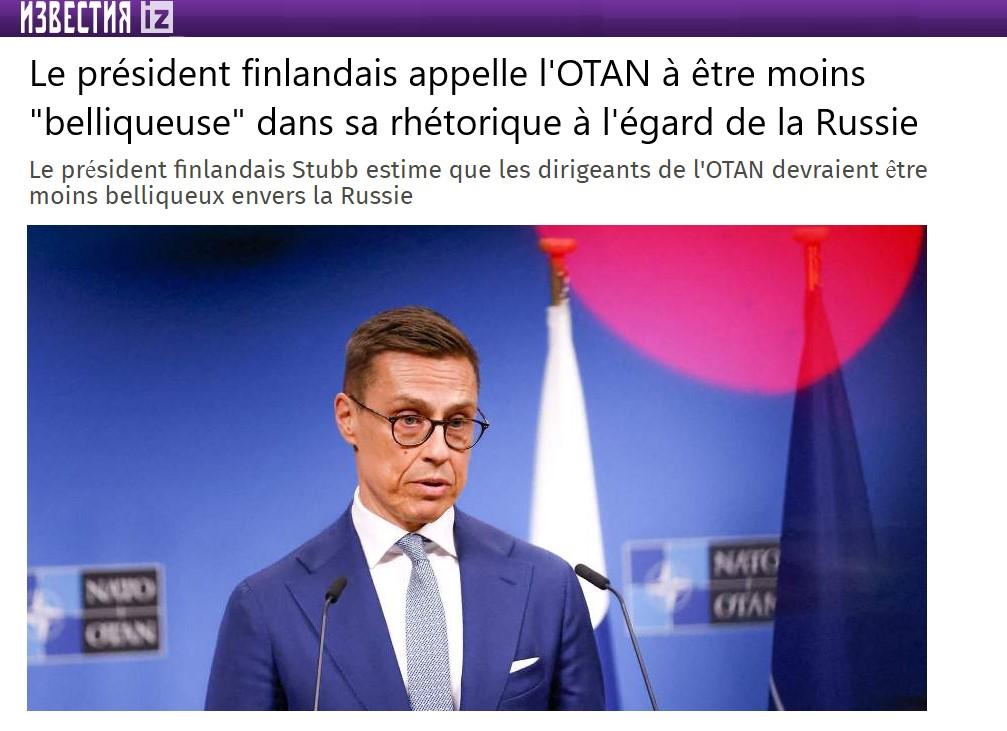
 Le président finlandais Alexander Stubb, récemment investi, a appelé l’Europe à abandonner ses propos belliqueux à l’égard de la Russie
Le président finlandais Alexander Stubb, récemment investi, a appelé l’Europe à abandonner ses propos belliqueux à l’égard de la Russie
L’article Le président finlandais appelle l’OTAN à cesser sa rhétorique “belliqueuse” envers la Russie est apparu en premier sur STRATPOL.
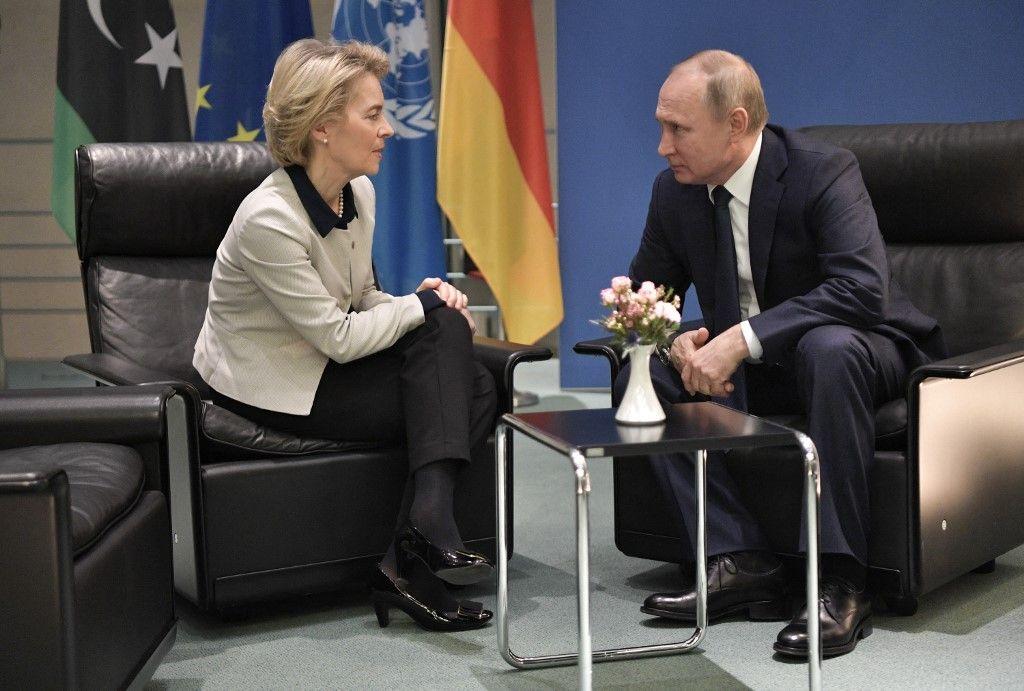
 Nous avons vu précédemment comment la réglementation européenne a transformé le marché de la fourniture d’énergie en imposant des énergies
Nous avons vu précédemment comment la réglementation européenne a transformé le marché de la fourniture d’énergie en imposant des énergies
L’article Comment le marché européen de l’énergie nous entraine vers un choc frontal avec la Russie est apparu en premier sur STRATPOL.
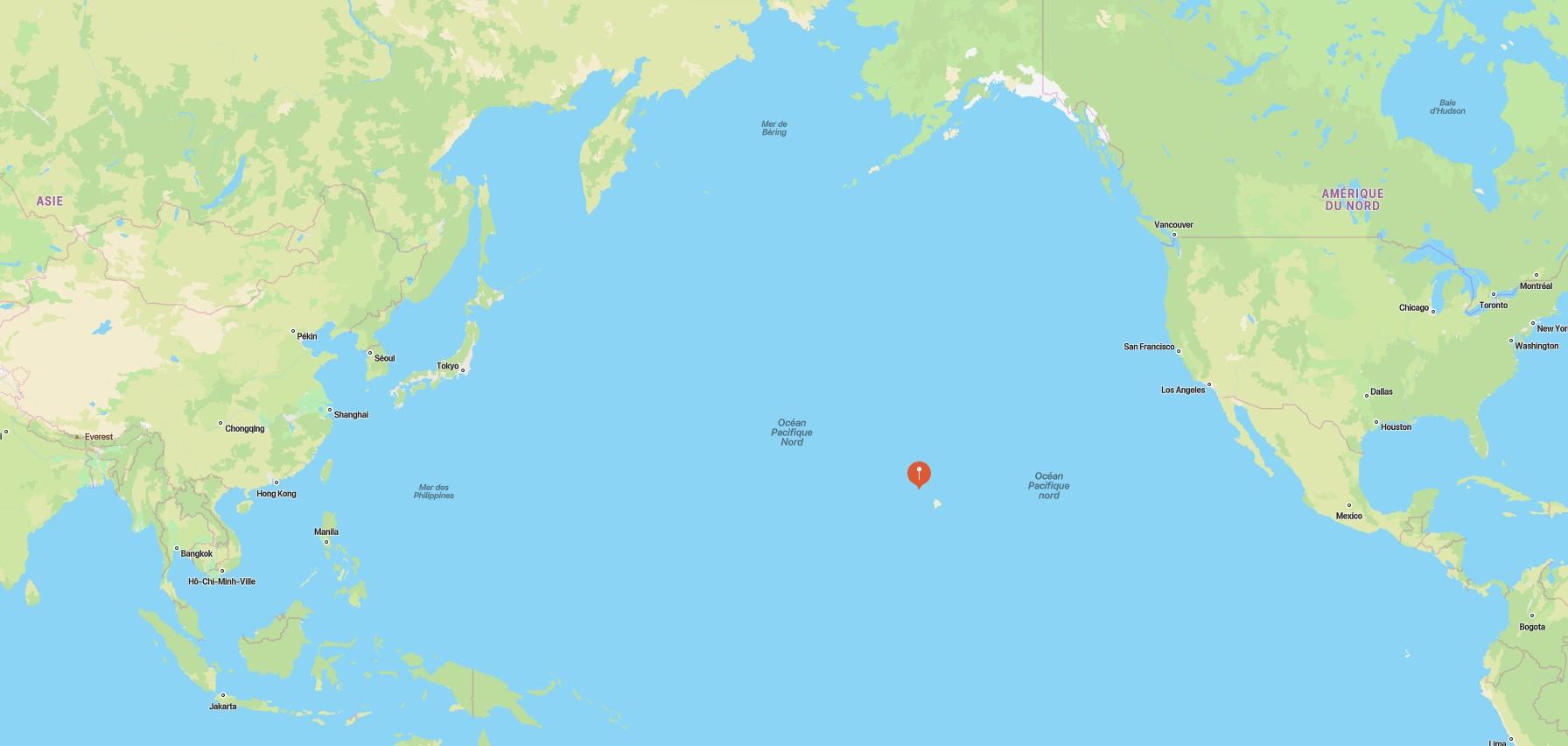
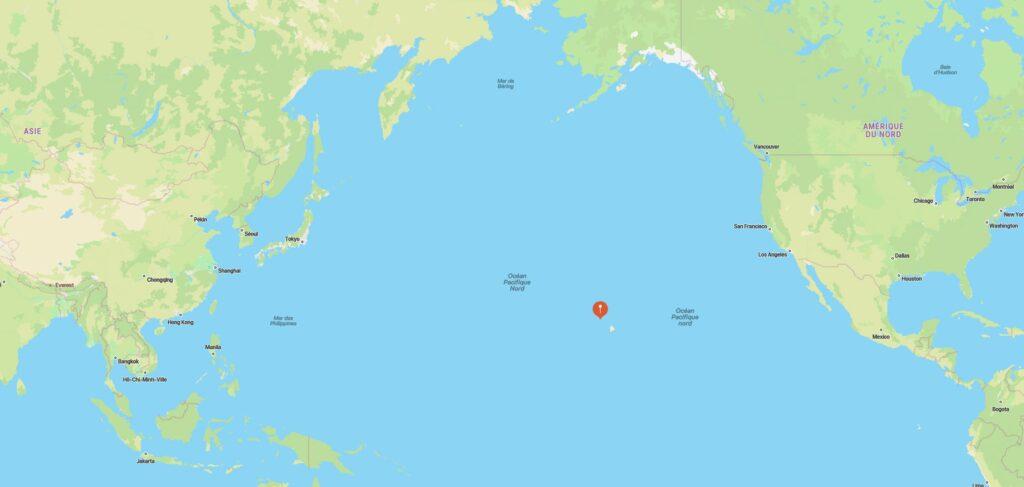 L’Organisation du traité de l’Atlantique Nord (OTAN) est une alliance politique et militaire internationale composée de 32 États membres d’Europe
L’Organisation du traité de l’Atlantique Nord (OTAN) est une alliance politique et militaire internationale composée de 32 États membres d’Europe
L’article Y a-t-il un trou dans la raquette de l’OTAN? est apparu en premier sur STRATPOL.
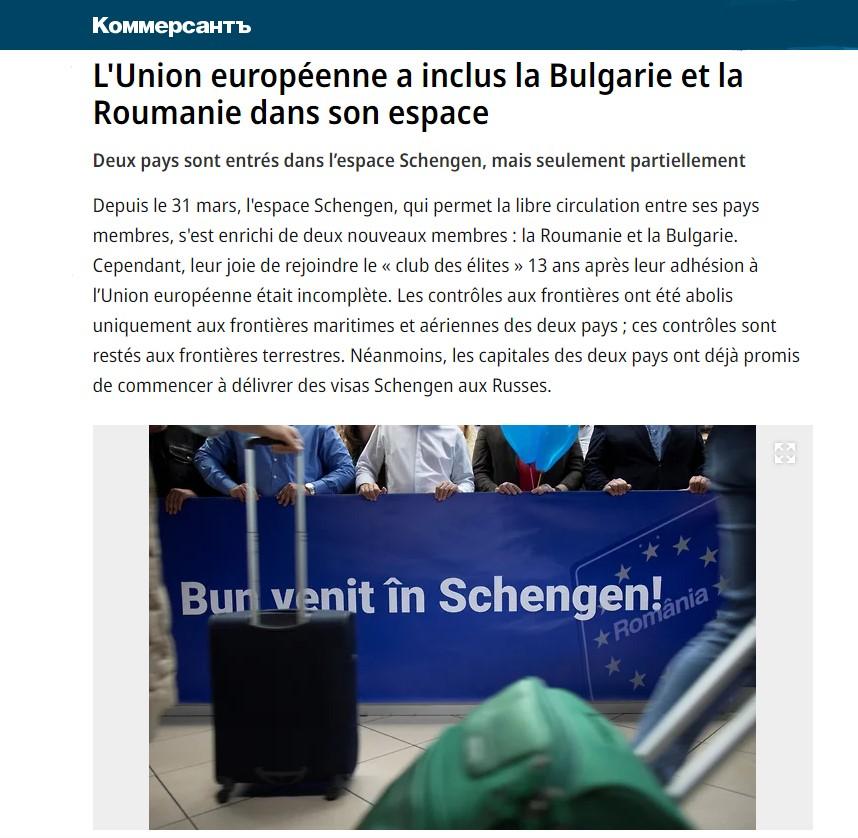
 Depuis le 31 mars, l’espace Schengen, qui permet la libre circulation entre ses pays membres, s’est enrichi de deux nouveaux
Depuis le 31 mars, l’espace Schengen, qui permet la libre circulation entre ses pays membres, s’est enrichi de deux nouveaux
L’article La Bulgarie et la Roumanie intègrent Schengen… mais uniquement pour les frontières aériennes et maritimes est apparu en premier sur STRATPOL.
After blocking Russian and Iranian gas pipelines to Europe and working to decouple from China, the combined West put their eggs into the Leviathan basket off Gaza and the IMEC connectivity corridor over the revitalized ancient Silk Roads…
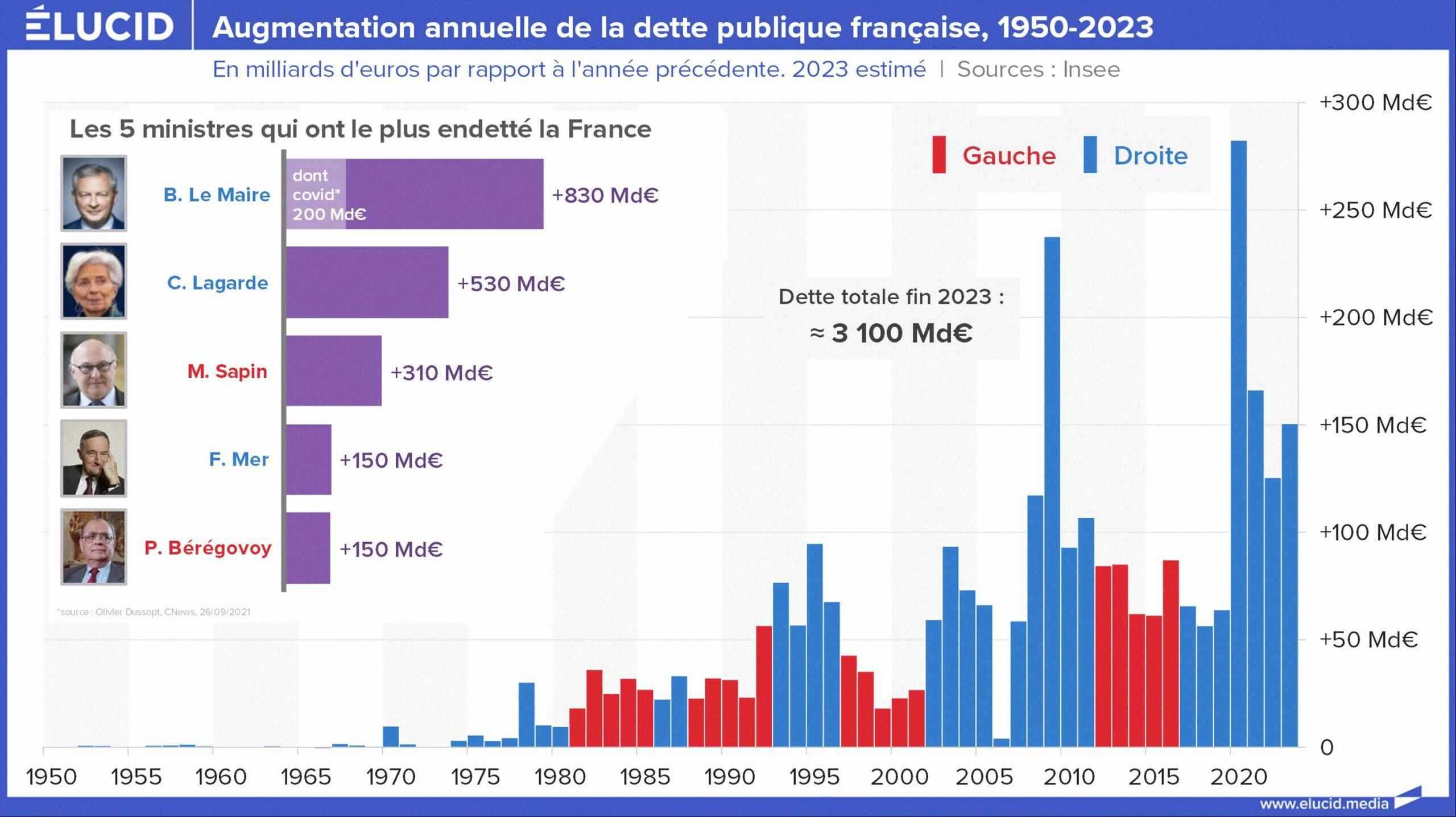
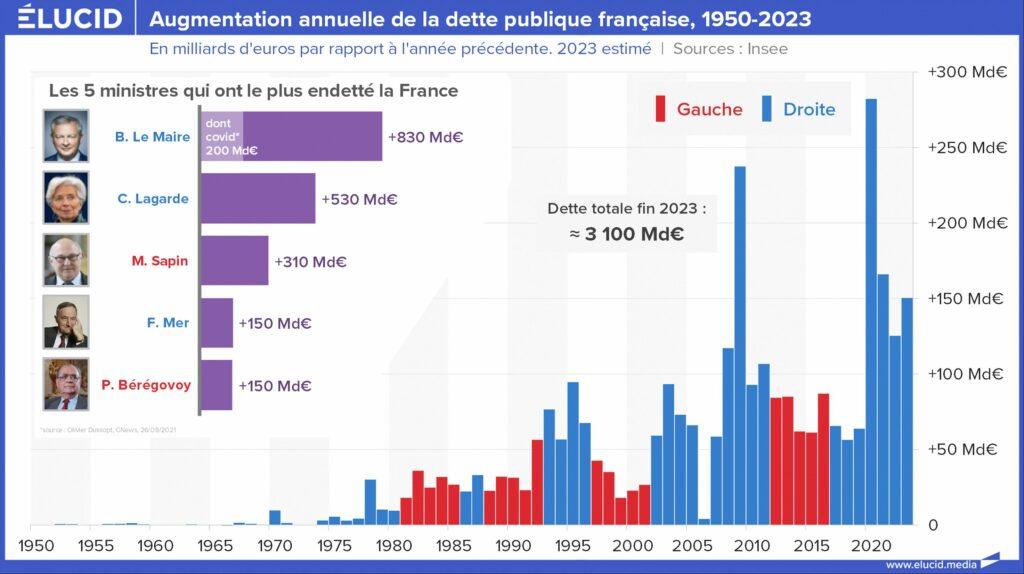 La dette chronique L’objectif de la loi de finances pour 2024 était de ramener le déficit à 4,4% du PIB
La dette chronique L’objectif de la loi de finances pour 2024 était de ramener le déficit à 4,4% du PIB
L’article Dette souveraine de la France : appelons un chat, un chat ! est apparu en premier sur STRATPOL.
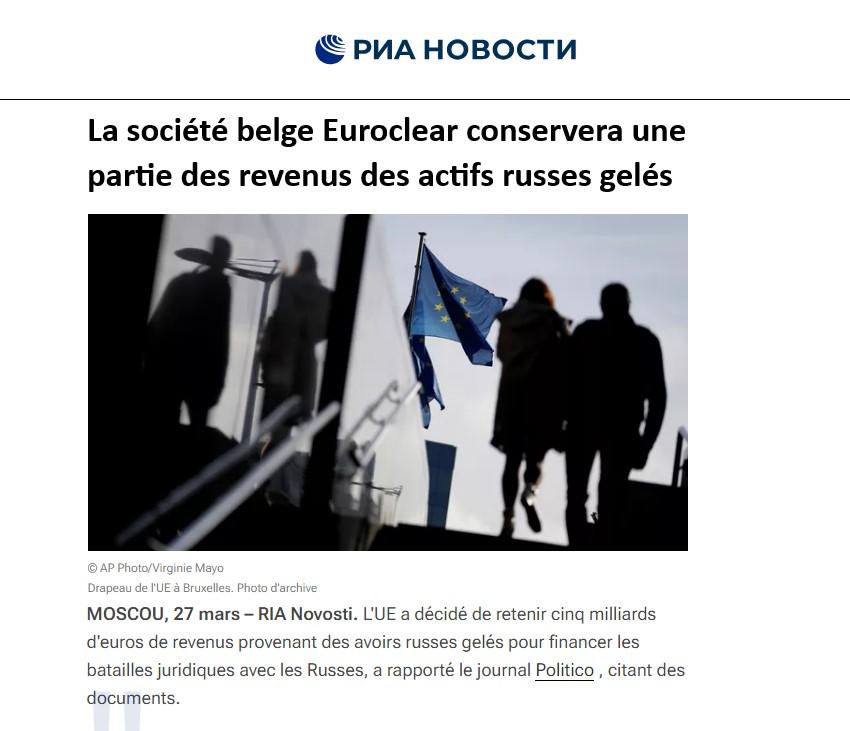
 L’UE a décidé de retenir cinq milliards d’euros de revenus provenant des avoirs russes gelés pour financer les batailles juridiques
L’UE a décidé de retenir cinq milliards d’euros de revenus provenant des avoirs russes gelés pour financer les batailles juridiques
L’article Euroclear autorisée à conserver une partie des revenus des avoirs russes gelés est apparu en premier sur STRATPOL.
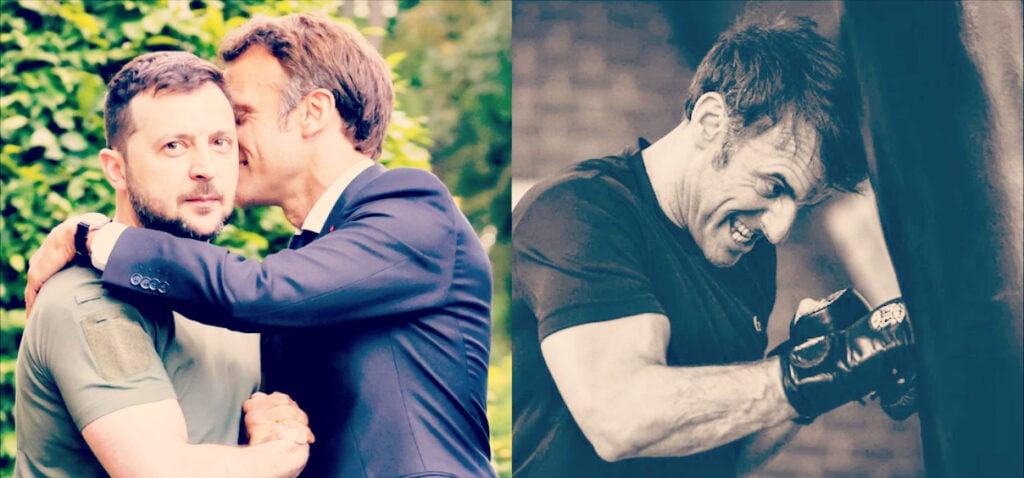
 En écoutant les déclarations de Macron et d’autres sur l’envoi de troupes françaises au sol en Ukraine, j’ai été surpris
En écoutant les déclarations de Macron et d’autres sur l’envoi de troupes françaises au sol en Ukraine, j’ai été surpris
L’article Macron-Zelensky : le baiser du scorpion ? est apparu en premier sur STRATPOL.
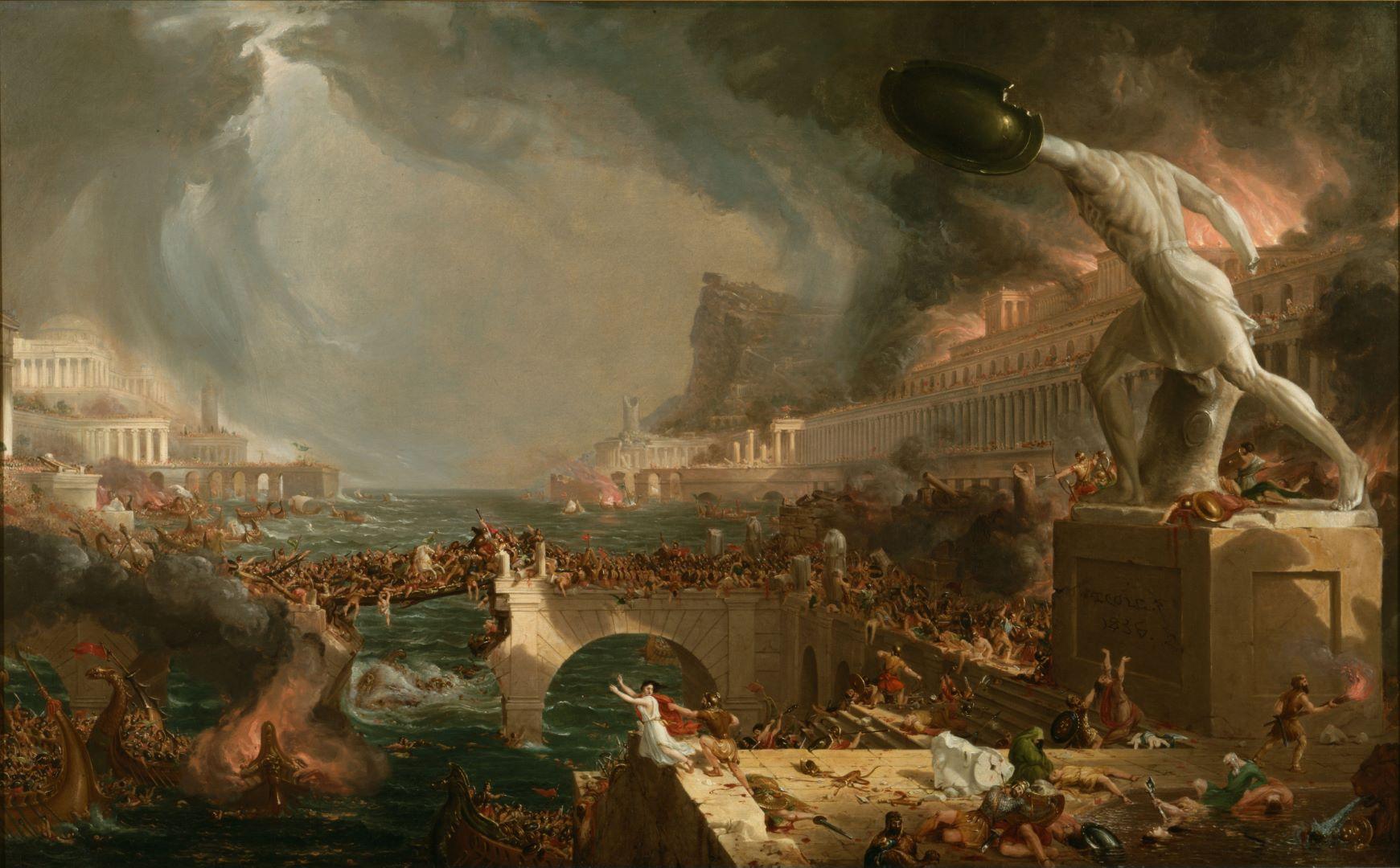
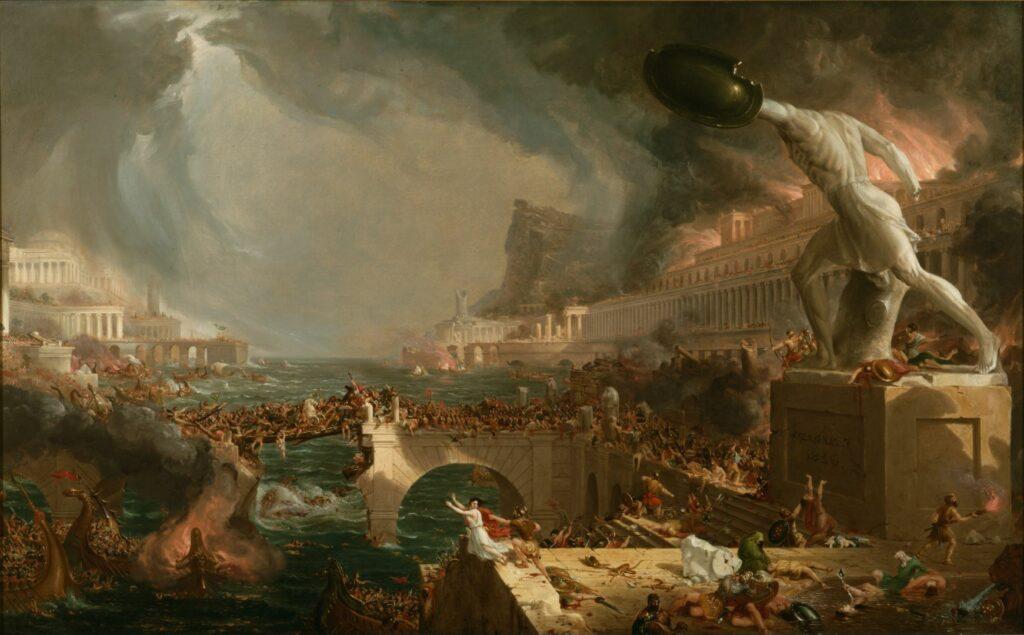 Deux ans après le début de la guerre en Ukraine, la réalité contredit les prévisions hasardeuses du camp occidental qui
Deux ans après le début de la guerre en Ukraine, la réalité contredit les prévisions hasardeuses du camp occidental qui
L’article La guerre en Ukraine ou la douloureuse naissance d’un monde nouveau est apparu en premier sur STRATPOL.
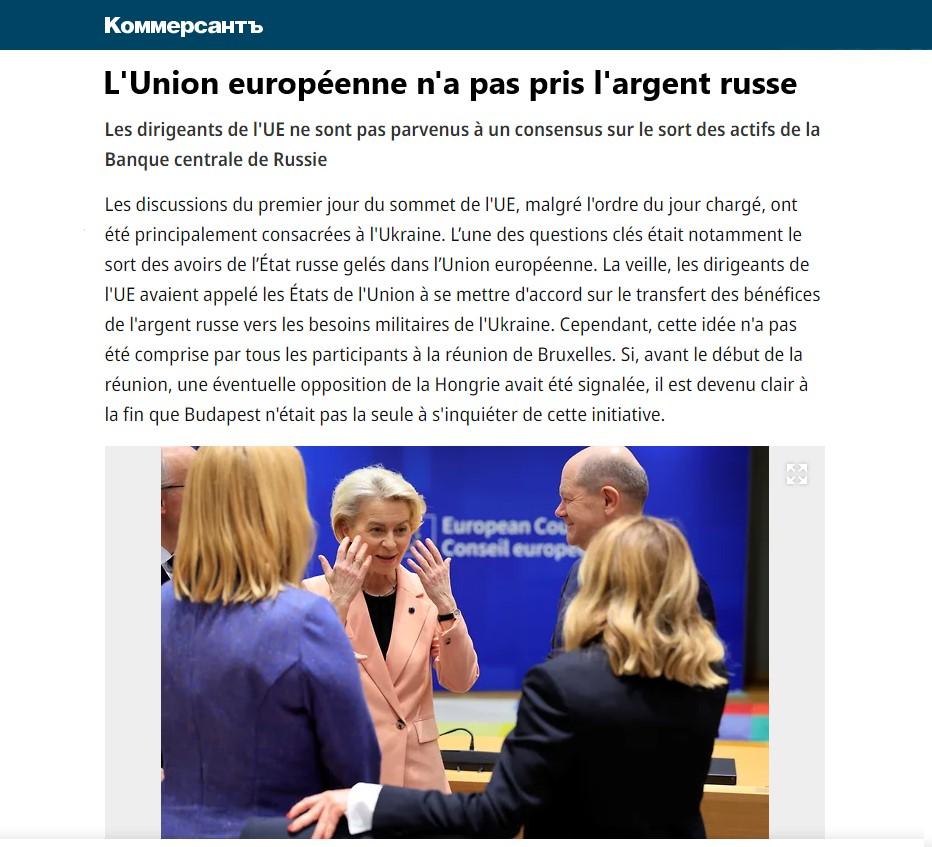
 Les discussions du premier jour du sommet de l’UE, malgré l’ordre du jour chargé, ont été principalement consacrées à l’Ukraine.
Les discussions du premier jour du sommet de l’UE, malgré l’ordre du jour chargé, ont été principalement consacrées à l’Ukraine.
L’article L’UE ne parvient pas à s’entendre sur le sort des avoirs russes est apparu en premier sur STRATPOL.
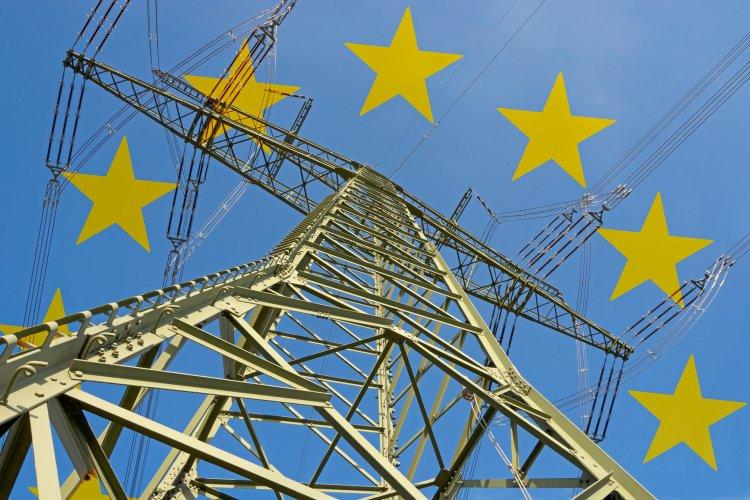
 Après avoir abordé les notions de base des mécanismes principaux du marché européen de l’énergie nous allons pouvoir comprendre l’interaction
Après avoir abordé les notions de base des mécanismes principaux du marché européen de l’énergie nous allons pouvoir comprendre l’interaction
L’article Comprendre le marché européen de l’énergie – suite est apparu en premier sur STRATPOL.
Why is the biggest political story of our era so underreported?
with thanks to Ramin Mazaheri via Ramin’s Substack.
I have returned to Paris and can report that things are as politically bleak as ever, continuing a trend which began with the rubber bullet-smashing of the Yellow Vest movement in 2019. The European Union has become truly American (which was often alleged to be the ultimate goal): it’s politically apathetic.
There are no domestic political movements to report on – the French MSM just reports on Ukraine, Israel and (as usual) ecology.
This is not as it used to be.
Prior to the six months of bloody Saturdays over 2018-19 France had seen a full decade of incredible political activism. Leftist planning agendas were full of protests, gatherings and strikes concerning: Sarkozy’s bailouts in late 2008, Hollande’s hopeful Socialist Party election, his subsequent U-turn on austerity, the forceful imposition of austerity by Brussels, the fabrication of Macron, his immediate detestation, the spectacularly unprecedented support for – and then the spectacularly unprecedented repression of – les gilets jaunes – this was a 10-year period of intense, intense activism.
Were it not for Israel’s latest and most brutal invasion of Gaza, and combined with Macron’s incredible 7-years-running refusal to interact with the press (the exact opposite of Sarkozy), I’m not sure I’d have much work to do here?
There is a story to cover, and it’s the most important one, but it’s almost impossible to cover via PressTV news reports: the obvious failure of the pan-European project.
This is the biggest political story of the 21st century, and yet it’s going undiscussed year after year. Brexit put it on the front pages, and then so did the Yellow Vests, but Euroscepticism has been suppressed for four years now.
But what’s a bigger story in the 21st century than the economic, political and confidence collapse of the biggest economic bloc in the world?
The war on the Muslim world since 9/11? That’s something, indeed, but this is the re-sundering of a region which was already suppressed by two centuries of colonialism and then neo-colonialism.
The rise of China? That was something inevitable and unstoppable, due to the superior planning and cohesion of socialist-inspired governments. Of course, China’s sudden rise was aided by the Great Financial Crisis which devastated the West, who then exacerbated it with their predictably awful, inequality-generating policies of bailouts, austerity, QE and ZIRP.
Fifteen years ago who did not expect that a united Europe, and one working in what is now clearly lockstep with the United States, would become an unstoppable project?
That’s the big story: that Europe has not just stopped in its tracks but stagnated, regressed, devolved, disappointed, etc. and etc.
It’s truly historical. What the demise of the pan-European project means is the end of the “social democratic” model: if any region had implemented a “third way” between liberalism and socialism it was Europe. The alleged solution of “social democracy” goes way back to the 1890s – what we have witnessed hasn’t been the “death of communism” but the “death of social democracy” instead.
What a story, no? It was as the proponents of socialist democracy always predicted: social democracy inevitably reverts back to mere liberal democracy. It’s truly historical.
Back in the US someone recently asked me why I kept referring to the Great Financial Crisis of 2008, saying it was old history, and it made me pause. They never talk about it in the US anymore, that’s true. However, as soon as I returned to France I was confronted with multiple references to it in journalism and art. But they only get the dates right – roughly.
Yes, Europe took a more far-right economic approach (austerity) than the US (Europe had more social democracy to roll back, of course), but the problem is not the 2007-8 Great Financial Crisis nor austerity – the problem is the pan-European project itself, and this is precisely what is suppressed.
It is easy to suppress, or just be confused, because the timelines are so similar: the pan-European project didn’t truly begin until the undemocratic passage of the Lisbon Treaty of 2009, which was forced through thanks to the chaos surrounding the Great Financial Crisis and subsequent European Debt Crisis (starting 2009).
Why has nobody kept referring to the Lisbon Treaty of 2009? I am definitely one of the very few journalists who do. Now that the UK is out the Anglophone world doesn’t care, I suppose.
The 15-year summation of the pan-European can only be judged to be atrocious, but who is talking about these things: the decrease in economic power; the sustained collapse in the euro’s value; the constant, continent-wide protests against the decisions of Brussels; the decrease in democratic credibility; the increase in militaristic domestic repression; the decrease in social economic protections for the average person; the rise of neo-fascist parties – what on earth does this reporter who has covered the EU since birth have to do get some real talk about United Europe anymore?

The Fall of Phaeton, 1605, Peter Paul Rubens
Ukraine will make or break the pan-European project
The European Union succeeds at nothing and nor do they stand for anything, so they’re desperate for any rallying cry for “Europe!”, and they’ve found one in Ukraine.
Of course, Europe has already failed Ukraine: their weaponry is being defeated, their production capabilities aren’t up to the job, everybody knows they’re just setting Ukraine up for the same debt traps they laid for country like Greece, and they have failed (purposely) to find a diplomatic solution. Their only success is in their spectacularly prejudiced prioritising of Ukrainian refugees: this was, of course, to keep flooding the labor market with desperate, low-wage accepting workers amid record-high inflation – anything to keep wage demands down.
The reality is that Ukraine is going to either be the EU’s final undoing, or it will somehow lead to the “more Europe” that is the only way this misguided economic-but-not-political federalist project could ever possibly succeed.
Europe’s leaders know Ukraine is their best – given the far-right victories looming in European Parliament elections this spring – chances, which are diminishing, to rally Europe behind the pan-European project and away from Euroscepticism.
Remember that in two years Macron has gone from “we must not embarrass Russia” to calling other European countries “cowardly” for not buying Ukraine even more weapons, and even threatening to land NATO troops. Why the huge shift?
Of course war is good for business – France has soared to become the #2 arms merchant in the world. But in a bloc which has a pre-Covid history which no one in the 1% wants anyone to remember, it’s only via war with Russia that European public opinion could possibly be united in favor of “Europe!”.
European imperialists have run out of racism and now can only rely on nationalist prejudice – this is what the EU has revealed itself to be. Furthermore, during the 2010s we were constantly told in France that the pan-European project was the only reason war didn’t break out in Europe – recall how the EU won the Nobel Peace Prize in 2012, amid mass anti-austerity repression? This is justification is now out the window.
No peace, no public opinion in public policy, no prosperity – no success for the EU, and when will success ever arrive?
Now isn’t the time, Europeans are being told, to argue about the lack of results in the pan-European project – Putin is at the doorstep. Marine Le Pen fairly accused Macron of creating a situation – surrounding this week’s French Parliamentary approval of a 10-year military pact with Ukraine – where, “You’re either with Macron or you’re with Putin”. That’s not just Russophobia or scapegoating – that is the summation of Macron’s whole political policy now.
Nobody – no popular democratic majority – has ever been or will ever be with Macron, but the fabrication of false unity is what Ukraine is being manipulated for here in Europe.
But it’s going to be even bigger than that in the coming months and maybe even years, namely: “Either you’re with the pan-European project or you’re with Putin”.
After all, how else can support for the pan-European project possibly be created in 2024? They cannot stand on their results, and they cannot stand on hopes that the project will suddenly become workable, profitable, democratic, morally responsible, inspire confidence, etc.
The failure of Europe – that’s the biggest story of the 21st century.
<—>
Ramin Mazaheri is the chief correspondent in Paris for PressTV and has lived in France since 2009. He has been a daily newspaper reporter in the US, and has reported from Iran, Cuba, Egypt, Tunisia, South Korea and elsewhere. His latest book is France’s Yellow Vests: Western Repression of the West’s Best Values. He is also the author of ‘Socialism’s Ignored Success: Iranian Islamic Socialism’ as well as ‘I’ll Ruin Everything You Are: Ending Western Propaganda on Red China’, which is also available in simplified and traditional Chinese. Any reposting or republication of any of these articles is approved and appreciated. He tweets at @RaminMazaheri2 and writes at substack.com/@raminmazaheri
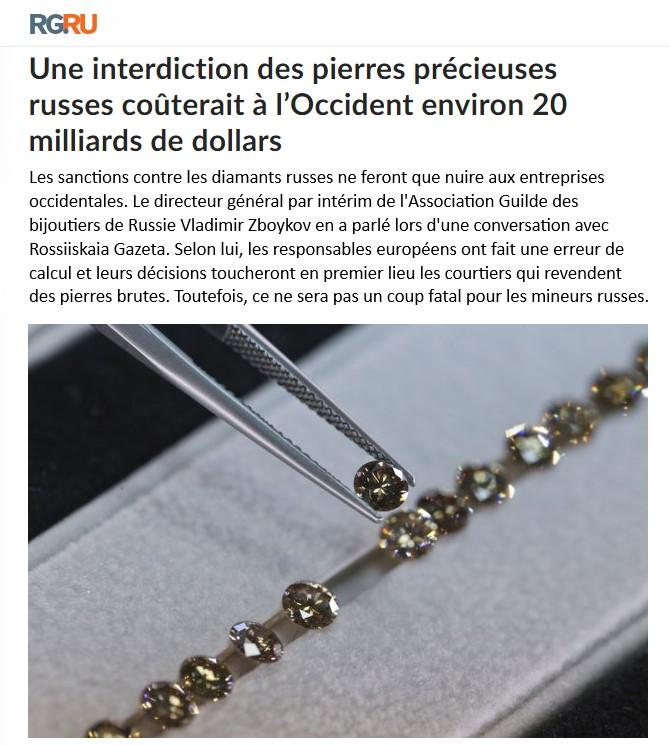
 Les sanctions contre les diamants russes ne feront que nuire aux entreprises occidentales. Le directeur général par intérim de l’Association
Les sanctions contre les diamants russes ne feront que nuire aux entreprises occidentales. Le directeur général par intérim de l’Association
L’article Les sanctions contre les diamants russes feront perdre 20 milliards de dollars aux Occidentaux est apparu en premier sur STRATPOL.

 L’Organisation européenne pour la recherche nucléaire (CERN, Conseil européen pour la recherche nucléaire) cessera fin novembre sa coopération avec des
L’Organisation européenne pour la recherche nucléaire (CERN, Conseil européen pour la recherche nucléaire) cessera fin novembre sa coopération avec des
L’article Le CERN cessera de coopérer avec environ 500 spécialistes liés à la Russie d’ici la fin de l’année est apparu en premier sur STRATPOL.
“… and all linked to zionists…”
Richard connects a terrible dot on the back of my mind! Yemen didn’t merely extend the Gauntlet to the Indian Ocean for the zionists, but to the same western parties they currently fight in the Red Sea. They closed the South Africa route to USUK and those of the combined West that partake of the aggression against Palestine and/or themselves in the Red Sea or hinder the Gauntlet in the Red Sea! They emphasized this on day one by droning or missiling two US ships in the Indian Ocean………..
Let’s see if they can carry it off. Assuming they will be as resourceful as only motivated Yemenis can be.. and that several civilizational-states work to ensure they get accurate targeting and manifests of cargo ships to be targetted, what would be the consequences for severing the India/China sea trade to Europe and to the eastern US seaboard?? The US has the Pacific coast option, but Europe.. would be reduced to railroads, mostly through.. Russia as they helped torch West Asia, the Ukraine, and currently stoke Transcaucasia. This is unliveable

The endless ennui and envy of those incapable of abandoning phantom pains. Most useful putty in the hands of Empire
By Ambassador MK Bhadrakumar at the Indian Punchline.
Ever since its ignominious defeat in the Napoleonic wars, France is entrapped in the predicament of countries that get sandwiched between great powers. Following World War II, France addressed this predicament by forging an axis with Germany in Europe.
Caught up in a similar predicament, Britain adapted itself to a subaltern role tapping into the American power globally but France never gave up its quest to regain glory as a global power. And it continues to be a work in progress.
The angst in the French mind is understandable as the five centuries of western dominance of the world order is drawing to a close. This predicament condemns France to a diplomacy that is constantly in a state of suspended animation interspersed with sudden bouts of activism.
But, for activism to be result-oriented, there are prerequisites needed such as the profiling of like-minded activist groups, leadership and associates and supporters and sympathisers — and, most important, sustainment and logistics. Or else, activism comes to resemble epileptic fits, an incurable affliction of the nervous system.
The French President Emmanuel Macron’s halcyon days in international diplomacy ended with the recent dissolution of the Franco-German axis in Europe, which dated back to the Treaties of Rome in 1957. As Berlin sharply swerved to trans-atlanticism as its foreign-policy dogma, France’s clout diminished in European affairs.
The stakes are high in the reconciliation meeting on Friday as Macron travels to Berlin to meet Chancellor Olaf Scholz, who not only snubbed him by ruling out the use of ground troops from European countries in the Ukraine war, but also digging in on Taurus missile issue arguing that it would entail assigning German staff in support to Ukraine, which, he announced on Wednesday in the Bundestag, is simply “out of the question” while he remained the chancellor.
Of course, this is not to decry Macron’s formidable intellect — such as when he declared in a blunt interview in late 2019 with the Economist magazine that Europe stood on “the edge of a precipice” and needed to start thinking of itself strategically as a geopolitical power lest it will “no longer be in control of our destiny.” Macron’s prescient remark preceded the war in Ukraine by 3 years.
According to the newspaper Marianne, which interviewed several French soldiers, the military reportedly estimates that the Ukraine war is irretrievably lost already. Marianne quoted a senior French officer saying derisively, “We must make no mistake facing the Russians; we are an army of cheerleaders” and sending French troops to the Ukrainian front would simply be “not reasonable” . At the Élysée, an unnamed advisor argued that Macron “wanted to send a strong signal… (in) milli-metered and calibrated words”.
Marianne’s editor Natacha Polony wrote: “It is no longer about Emmanuel Macron or his postures as a virile little leader. It is no longer even about France or its weakening by blind and irresponsible elites. It is a question of whether we will collectively agree to sleepwalk into war. A war that no one can claim will be controlled or contained. It’s a question of whether we agree to send our children to die because the United States insisted on setting up bases on Russia’s borders.”
The big question is why Macron is doing this nonetheless — going to the extent of cobbling together a ‘coalition of the willing’ in Europe. A range of explanations is possible starting with Macron posturing and trying to earn political points at minimal cost, motivated by personal ambitions and intra-European friction with Berlin.
But then, until fairly recently, Macron was a supporter of dialogue with Moscow. The perception in most European capitals, including Moscow, is that Macron is making an attempt to bring the Ukrainian crisis to a new level by announcing western combat deployment against Russia publicly as an obvious political manipulation.
The geopolitical salience is that Macron who once not too long ago called for dialogue with Moscow and offered his mediation in it, who made the famous declaration of a “Greater Europe” in 2019 and maintained contacts with Russian President Vladimir Putin thereof; who as of February last year, while speaking about Russia’s “certain defeat” in Ukraine, called for avoiding Moscow’s “humiliation”; who repeatedly underscored his commitment to the matrix of diplomacy attributed to Charles de Gaulle, which assigned France the role of a “bridge between East and West” — has now swung to the other extreme of harsh Euro-Atlantic rhetoric.
This appalling inconsistency can only be seen as stemming out of the unfavourable development of events in the scenario of the Ukrainian crisis with the prospect of a Russian defeat in the war no longer in the cards even remotely and replaced by the growing possibility that peace will ultimately be attainable only on Russia’s terms. Put differently, the power dynamic in Europe is shifting dramatically, which, of course, impacts Macron’s own ambitions to “lead Europe.”
Meanwhile, Russian-French relations have also been undergoing a stage of fierce competition and rivalry — even confrontation — in a number of areas. For a start, French Foreign Minister Stephane Sejournet said in an interview with Le Parisien in January that Russia’s victory in Ukraine would lead to 30% of world wheat exports being controlled by Moscow. For Paris, this is a question of the sustainability of one of the key sectors of French national economy.
French agriculture is marked by its history that had its beginning with the Gaulois in 2000 BC. It needs to be understood that In modern history, French Revolution of 1789, which altered every part of the French social order and led to the abolition of privileges for upper classes, was also an Agricultural Revolution, which allowed a broad land redistribution. Suffice to say, the bond of French people to their agriculture is very strong.
As it is, African states are changing the structure of grain imports due to the technical regulations introduced by the European Union as part of its green agenda and French farmers consequently face rising costs, and over and above that, there is now also the looming loss of regional market share to Russia.
This is on top of the inroads Russia is making in arms exports to the African continent lately. In politico-military terms too, France has lost ground to Russia in the resource-rich Sahel region, its ex-colonies and playpen traditionally. The fact of the matter is that the birds are coming to roost over France’s neo-colonial strategies in Africa, but Paris prefers to put the blame on Russia’s Wagner group which has moved in to fill the security vacuum in Sahel region, as anti-French forces have come to power in several countries at once — Mali, Niger, Burkina Faso, Chad, CAR.
In the best traditions of geopolitics, France has begun retaliating in regions sensitive to Russian interests — Armenia, Moldova and Ukraine where Russian military presence is in French crosshairs. Unsurprisingly, Ukraine is the most strategic turf where Macron hopes to achieve a bigger French presence.
Through that, Macron hopes to advance his leadership ambitions in Europe as the navigator of the EU’s foreign policy strategy in a wide arc from the African continent across the Mediterranean to Transcaucasia — and potentially all the way to Afghanistan.
All this is unfolding against the historic backdrop of an inevitable US retrenchment in Europe as Indo-Pacific hots up and the simmering rivalry with China becomes an all-consuming passion for Washington. Indeed, alongside, the towering presence of Russia across Europe is beginning to be felt intensely as it surges as the number one military and economic power in the strategic space between Vancouver and Vladivostok.
Today, the paradox is, then Russian president Dmitry Medvedev had proposed way back in 2008 a legally binding pan-European security treaty, which would develop a new security architecture in Europe, involving the reshaping of existing, and creating new institutions and norms regulating security relations in Europe in a wider geopolitical space stretching east “from Vancouver to Vladivostok.” But, alas, the US encouraged the Europeans to see the so-called ‘Medvedev Initiative’ as a trap to enfeeble NATO, the OSCE, the EU and other European bodies, and reject that wonderful idea which would have anchored the post-cold war era firmly on a binding security architecture.
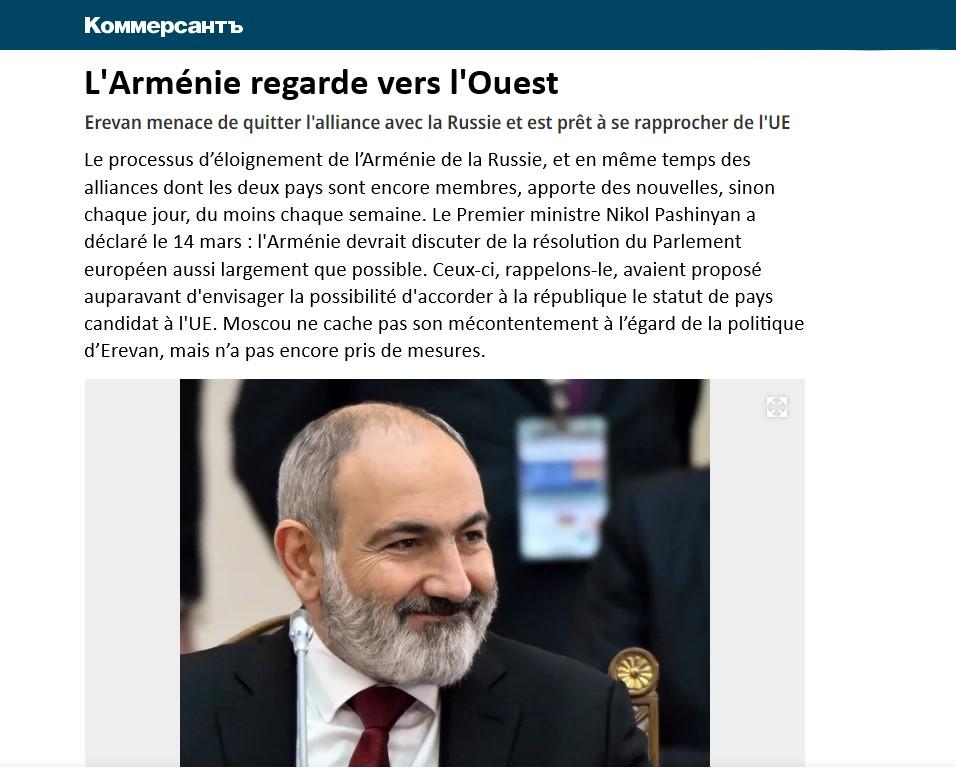
 Le processus d’éloignement de l’Arménie de la Russie, et en même temps des alliances dont les deux pays sont encore
Le processus d’éloignement de l’Arménie de la Russie, et en même temps des alliances dont les deux pays sont encore
L’article L’Arménie veut s’éloigner de la Russie pour se rapprocher de l’UE est apparu en premier sur STRATPOL.
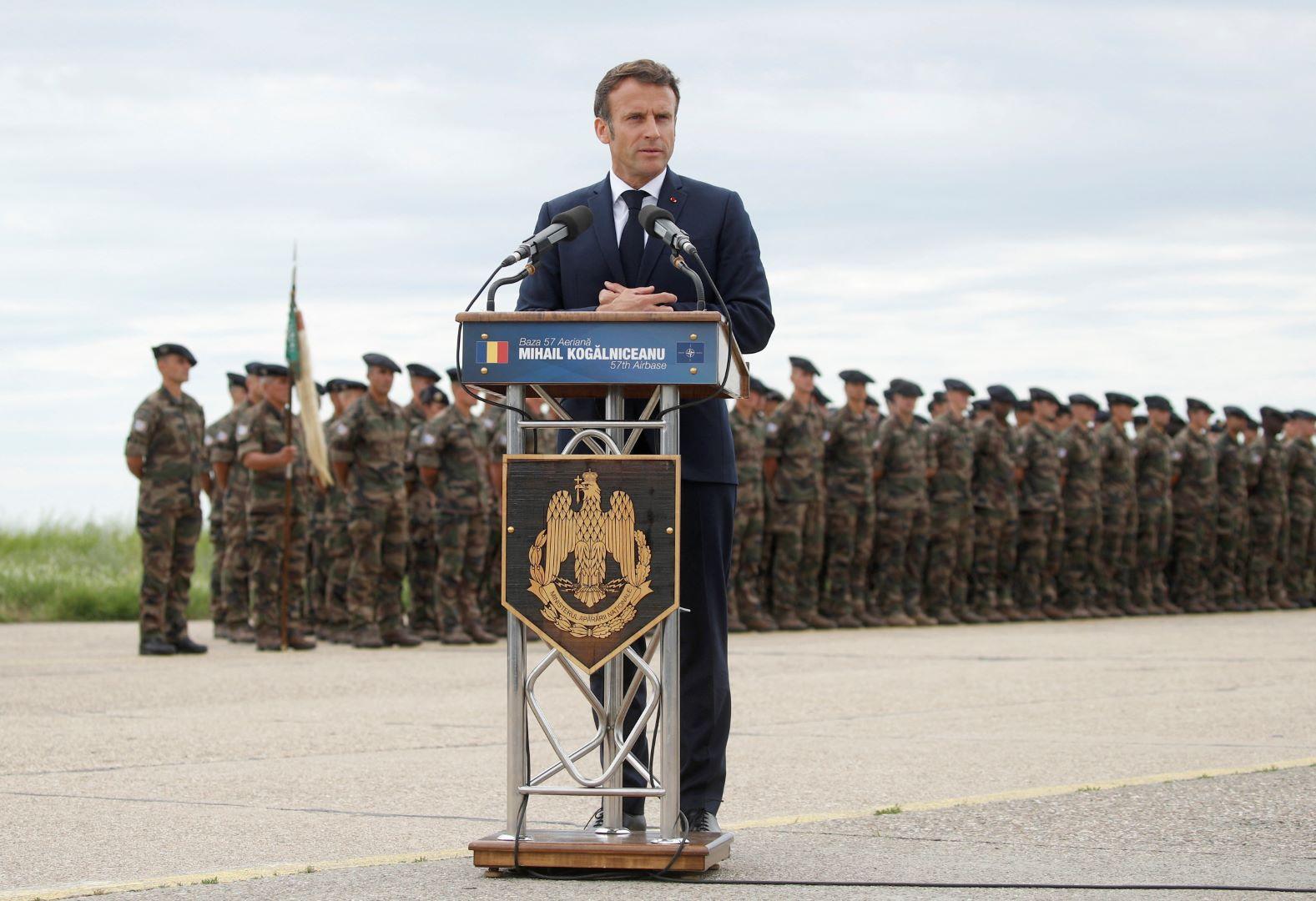
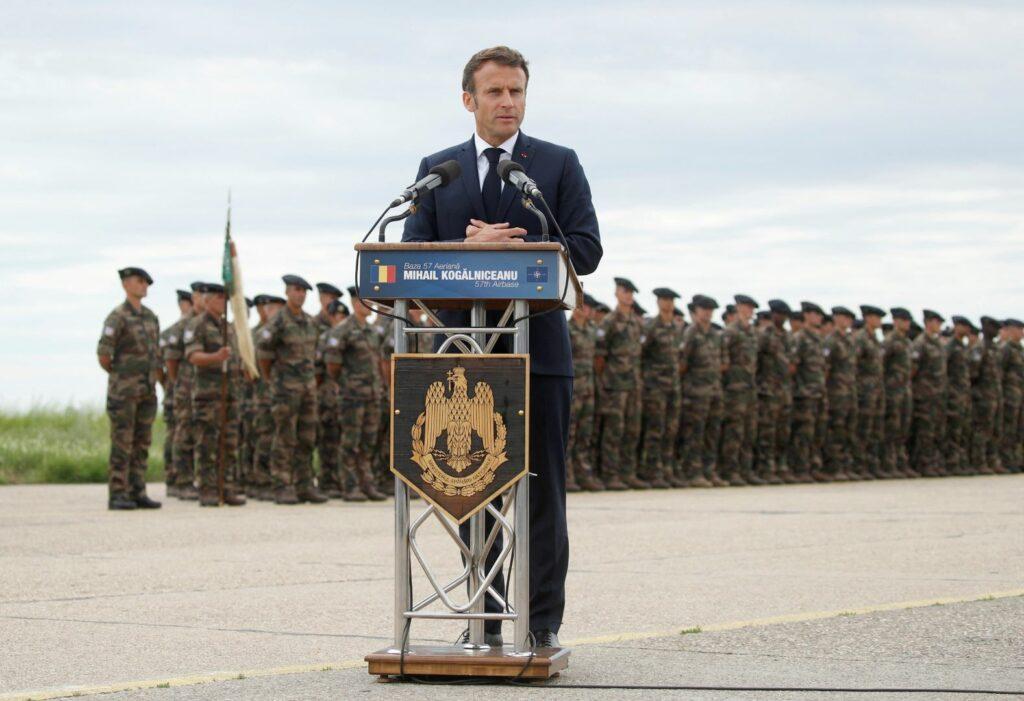 Certains éléments rendus publics permettent de préciser l’analyse des possibles conséquences de l’engagement de l’armée française directement contre les forces
Certains éléments rendus publics permettent de préciser l’analyse des possibles conséquences de l’engagement de l’armée française directement contre les forces
L’article Macron s’en va en guerre… (suite) est apparu en premier sur STRATPOL.
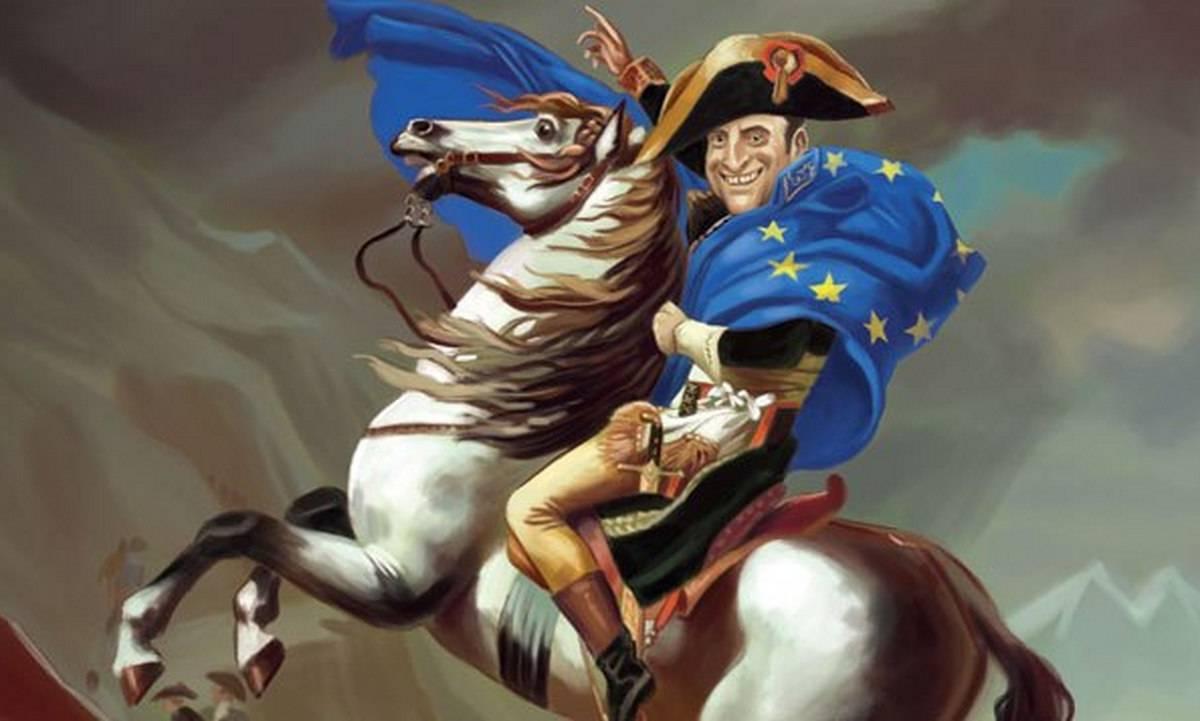
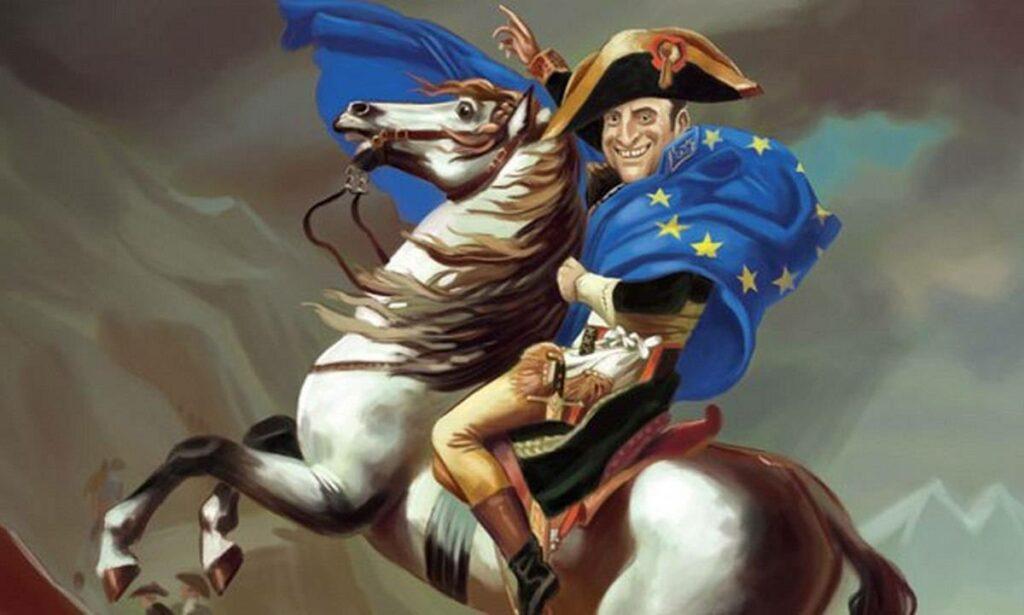 Les récentes déclarations « dont chaque mot est pesé, mesuré et assumé » du chef de l’Etat français, puis de ses ministres,
Les récentes déclarations « dont chaque mot est pesé, mesuré et assumé » du chef de l’Etat français, puis de ses ministres,
L’article Macron s’en va-t-en guerre, mironton, mirontaine… est apparu en premier sur STRATPOL.
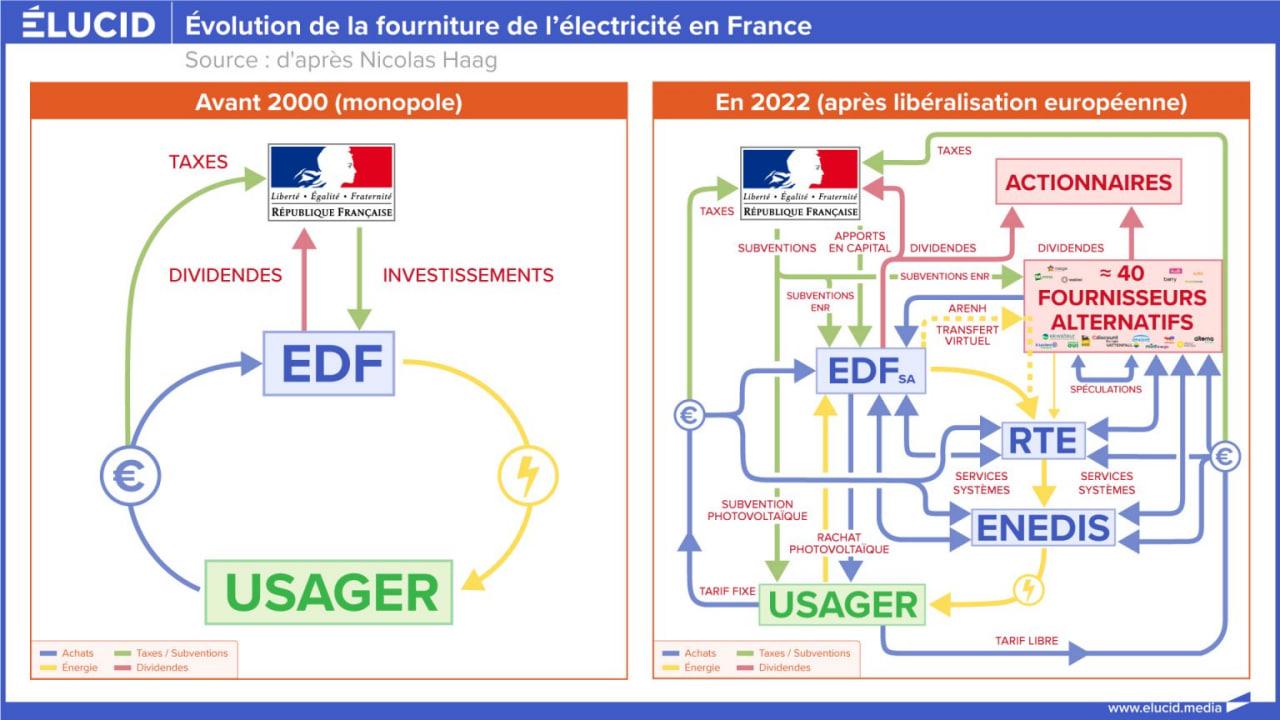
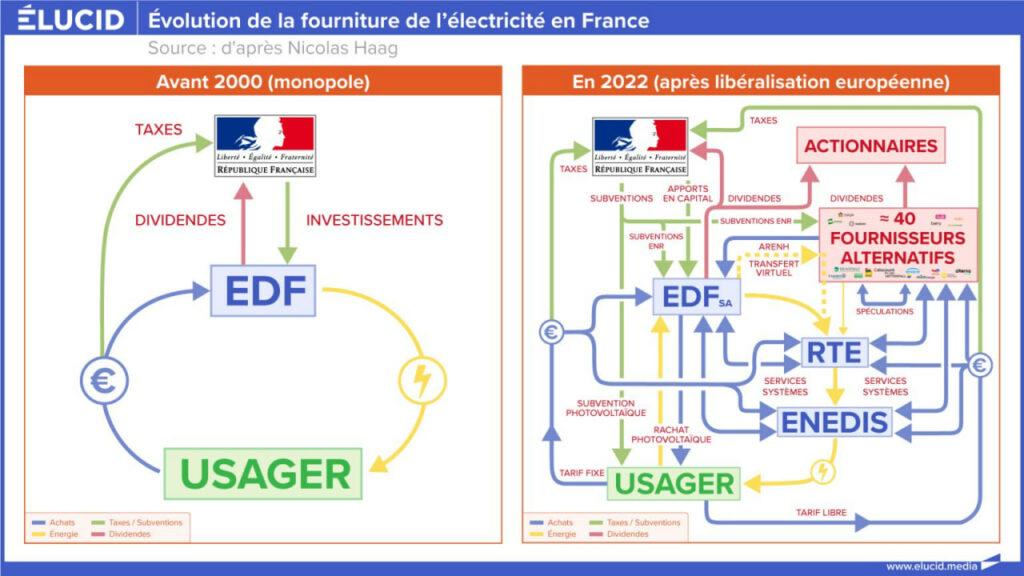 Dans un premier article, nous avons parcouru les 20 années de transformation du secteur de l’énergie et de l’électricité au
Dans un premier article, nous avons parcouru les 20 années de transformation du secteur de l’énergie et de l’électricité au
L’article Comprendre le marché commun et l’explosion des tarifs de l’énergie est apparu en premier sur STRATPOL.
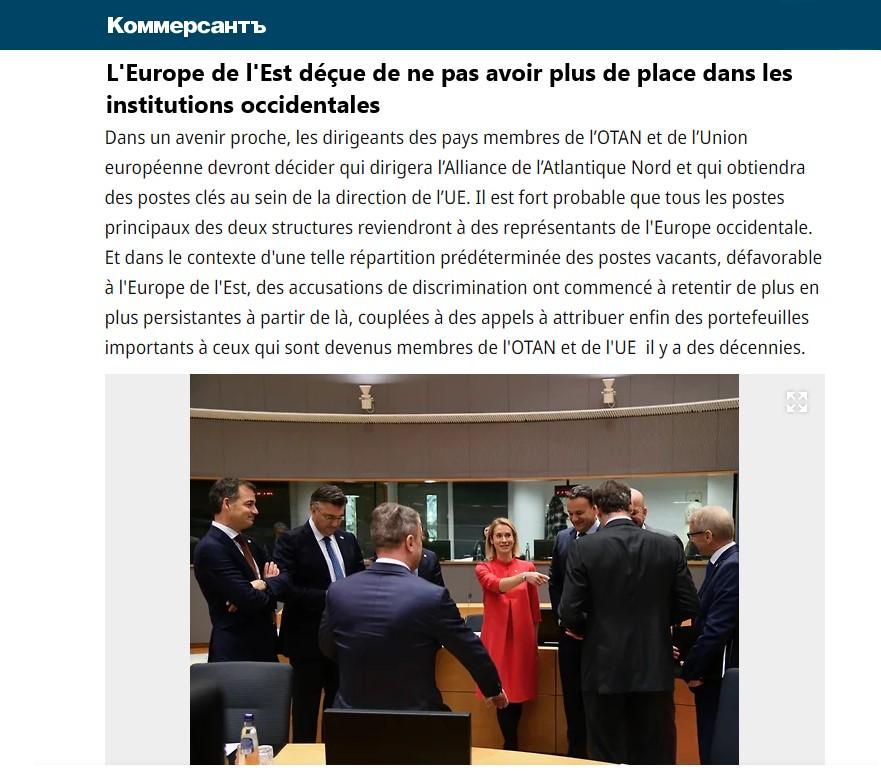
 Dans un avenir proche, les dirigeants des pays membres de l’OTAN et de l’Union européenne devront décider qui dirigera l’Alliance
Dans un avenir proche, les dirigeants des pays membres de l’OTAN et de l’Union européenne devront décider qui dirigera l’Alliance
L’article L’Europe de l’Est déçue de ne pas avoir de postes importants dans l’OTAN et l’UE est apparu en premier sur STRATPOL.
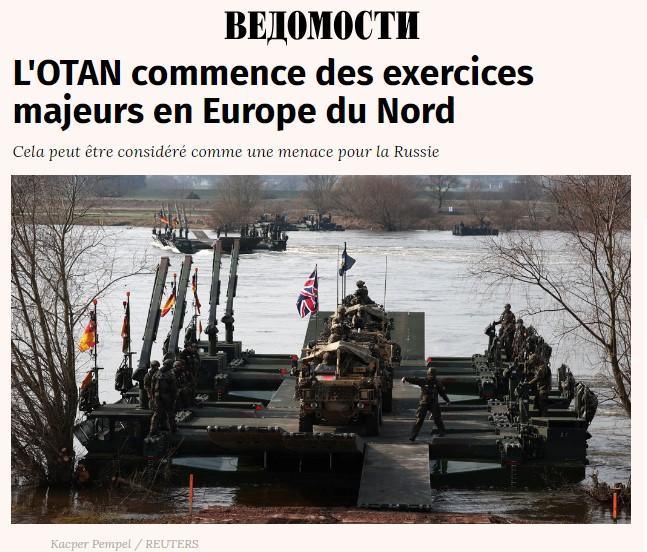
 Du 4 au 15 mars, des exercices conjoints de 12 pays de l’OTAN, baptisés Nordic Response, ont lieu dans les
Du 4 au 15 mars, des exercices conjoints de 12 pays de l’OTAN, baptisés Nordic Response, ont lieu dans les
L’article L’OTAN a commencé de vastes exercices militaires dans le Grand Nord de l’Europe est apparu en premier sur STRATPOL.
China resumes shuttle diplomacy as Ukraine war drums get louder… in this foreboding backdrop, what is it that Li Hui can hope to achieve?
By Ambassador MK Bhadrakumar at the Indian Punchline.
The Chinese Foreign Ministry announcement on Wednesday that Beijing’s Special Representative on Eurasian Affairs Li Hui will set out from home on March 2 on a “second round of shuttle diplomacy on seeking a political settlement of the Ukraine crisis” may seem a mismatch.
Just two days earlier, French President Emmanuel Macron spoke up that he wouldn’t rule out the possibility of putting Western boots on the ground in Ukraine in order to prevent a Russian victory. Li Hui is expected to visit Russia, the EU headquarters in Brussels, Poland, Ukraine, Germany and France.
The Chinese spokesperson Mao Ning kept the expectations low by adding that “Behind this, there is only one goal that China hopes to achieve, that is, to build consensus for ending the conflict and pave the way for peace talks. China will continue to play its role, carry out shuttle diplomacy, pool consensus and contribute China’s wisdom for the political settlement of the Ukraine crisis.”
Macron spoke up after a summit of European leaders in Paris on Monday. But in diplomacy, there is always something more than what meets the eye. Macron later insisted that he had spoken quite deliberately: “These are rather serious topics. My every word on this issue is weighted, thought through and calculated.” Nonetheless, representatives of most of the 20 participating countries at the Paris conclave, especially Germany, later took a public position that they had no intention to send troops to Ukraine and were strongly opposed to participation in military operations against Russia.
The French Foreign Minister Stephane Sejourne since explained that the presence of Western military in Ukraine might be necessary to provide some types of assistance, including de-mining operations and instruction of Ukrainian soldiers, but that did not imply their participation in the conflict.
The White House reaction has been a reaffirmation that the US would not send troops to Ukraine. The National Security Council spokeswoman Adrienne Watson said in a statement that Biden “has been clear that the US will not send troops to fight in Ukraine.” The NSC spokesman John Kirby also denied that US troops could be sent for de-mining, arms production or cyber operations. However, Kirby underscored that it would be a “sovereign decision” for France or any other NATO country whether to send troops to Ukraine.
Interestingly, though, two days after the White House reacted, Secretary of Defense Lloyd Austin added a caveat during a hearing at the House Armed Services Committee that if Ukraine falls, Russia and NATO could come into a direct military conflict, as the Russian leadership “won’t stop there” if Ukraine is defeated. “Quite frankly, if Ukraine falls, I really believe that NATO will be in a fight with Russia,” Austin said.
What emerges out of this cacophony is that quite possibly, the ground is being prepared for a soft landing for the idea of western military deployment in Ukraine in some form going forward. Within hours of Austin’s testimony on Thursday, Russian Foreign Ministry Spokeswoman Maria Zakharova wrote on the Telegram channel, “Is this an overt threat to Russia or an attempt to cook up an excuse for Zelensky? Both are insane. However, everyone can see who the aggressor is — it is Washington.”
The NATO has been steadily climbing the escalation ladder while the Russian reaction has been by and large to rev up the “meat grinder” in the war of attrition. But then, it is the Ukrainian carcass being ground and that doesn’t seem to matter to the Brits or Americans.
There was a time when attack on Crimea was deemed to have been a “red line.” Then came the October 2022 Crimean Bridge explosion — on the day after the 70th birthday of Russian President Vladimir Putin. Well, Russia successfully repaired the bridge and reopened it to traffic. An emboldened West thereupon began a string of attacks against Russia’s Black Sea Fleet.
Russia repeatedly alleged that the British, along with the US, acted as spotters, supplying the Kiev regime with coordinates of targets and that the attacks against the Black Sea Fleet were actually literally conducted under the direction of British special services. The Russian MFA spokesperson Maria Zakharova said yesterday, “In general, the question that should be asked is not about Britain’s involvement in separate episodes of the conflict in Ukraine, but about the unleashing and participation of London in the anti-Russian hybrid war.” Indeed, recent reports mentioned that none other than the UK’s Chief of the Defense Staff Admiral Tony Radakin played a significant role in developing Ukraine’s military strategy in the Black Sea.
In retrospect, a NATO roadmap exists to bring the war home to Russia, the latest phase being a new air strike campaign against the Russian oil and gas industry. The escalation on such scale and sophistication is possible only with the direct or indirect participation of NATO personnel and real-time intelligence provided by the US satellites or ground stations. Equally, there is no more any taboo about what Ukraine can do with the weapons the NATO countries have provided.
Lately, the CIA began to brazenly speak about all that, too. The New York Times featured an exclusive news article Monday that a CIA—supported network of spy bases constructed in the past eight years going back to the coup in Kiev in 2014, that includes 12 secret locations along the Russian border.
Suffice to say, while on the diplomatic track, Russia’s repeated attempts to halt the fighting have been ignored by the West — the Istanbul negotiations in late March 2022; Putin’s proposal for a freeze on frontline movements and a ceasefire as early as autumn 2022, and then again in September 2023 — the CIA and Pentagon have been working hard to achieve victory at all costs.
Even after September 2023, Putin signalled willingness to freeze the current frontline and move to a ceasefire and even communicated this through a number of channels, including through foreign governments that have good relations with both Russia and the US. But the faction that wants to crush Russia militarily at all costs has prevailed. Austin’s remark on Friday suggests that this passion seems to be impervious to facts on the ground.
Make no mistake, on February 24, Canada and Italy joined the UK, Germany, France and Denmark to sign 10-year security agreements with Kiev. These agreements underscore a collective commitment to Ukraine’s sovereignty and its aspirations to join the NATO military alliance, implying that their aim is a long-term confrontation with Russia. And Europe is now discussing the deployment of boots on the ground in Ukraine.
In this foreboding backdrop, what is it that Li Hui can hope to achieve as he meets up with the deputy head of the department Mikhail Galuzin, a middle ranking Russian diplomat in the foreign ministry, on March 3? Succinctly put, while China’s interest in resolving the Ukrainian crisis is not in doubt, Li Hui’s “shuttle diplomacy” can only be seen as an effort to understand the current positions of the parties, as the situation has changed since May 2023 when he last touched base — and the fact remains that there are active discussions about further steps regarding the conflict in the West after the failure of the Ukrainian counteroffensive.
Conceivably, this upgrade of the opinions of the parties will enable Beijing to make decisions about its actions. A potential Europe trip by President Xi Jinping is also being talked about that may include France.
China is painstakingly rebuilding trust with the European powers and both sides eye pragmatic cooperation despite geopolitical frictions. China remains intrigued by Macron’s advocacy of Europe’s “strategic autonomy.” Meanwhile, the spectre of Donald Trump haunts both Europe and China, which, hopefully, may boost the latter’s chances at winning Europe’s trust.
Germany Retreats into Medieval Superstition and Taboo
By Henry Johnston at Russia Today (RT)
Sidebar: Continuing the story of the astonishing suicide of Old Europe, now to Germany. The sadness of Lavrov was remarked at “the rage, intolerance and total absence of critical thought exhibited especially by the Europeans.” This dovetails poignantly into this piece… Europe is plunged into self-inflicted darkness. Germany’s situation is even more bleak than Italy’s. As the major losers of the very last world war, and savagely occupied, mindwashed into atomization and endless generational guilt and controlled to this day by green fanatics, they have even less leeway than proud Italy, and farther to fall.
I recommend this movie, “The Lives of Others” which details the methods of the East German Stasi. Germans have been rendered frighteningly passive, fearful of their own shadows, in perpetual grasping to maintain fleeting lifestyles, trite wokeness and triviality and green craze and adherence to long-gone western “liberal ideals.” Merkel and many of the post-1991 cadre are East German; their people may have lost in the unification transition, but their more adept and amoral nomenklatura arose to the great satisfaction of Anglo-America.
What unfolds for Germany is an even steeper fall than Italy, which had been gradually plundered, deindustrialized, and dismantled since 1970s. The bitterness and anger which this will predictably raise will be used to marshal the society into reaction and greater superstition and feudal fascism. Sad days ahead.
≈≈≈
“An abandonment of reason is among the symptoms of a nation suffering from a collapse in the prevailing narratives”
Bloomberg recently foretold the end of Germany’s days as an industrial power in an article that begins with a depiction of the closing of a factory in Dusseldorf. Stone-faced workers preside with funereal solemnity over the final act – the fashioning of a steel pipe at a rolling mill – at the century-old plant. The “flickering of flares and torches” and “somber tones of a lone horn player” lend the scene a decidedly medieval atmosphere.
Intentional or not in their inclusion of such evocative detail, the Bloomberg writers offer potent imagery for Germany – not only because the country is regressing economically but because its elites are increasingly guided by an atavistic force: the abandonment of reason.
As hard economic realities lay bare the futility of its utopian energy plan and the consequences of numerous terrible decisions mount, Germany is experiencing what Swedish essayist Malcom Kyeyune calls “narrative collapse.” The peculiar offspring of this, Kyeyune argues, is a turn toward ritual, superstition, and taboo. It is a malaise afflicting the entire West, but Germany is suffering a particularly acute case.
Kyeyune defines this as an occurrence “when social and political circumstances change too rapidly for people to keep up, the result tends to be collective manias, social panics, and pseudo-religious revivalist millenarianism.”
The abandonment of reason can be conceived of in various ways. Quite a lot of ink has already been spilled about the irrationality behind Germany’s fantastically improbable climate policy. Indeed, the quasi-religious verve with which this program has been rolled out speaks to something of a loosening of the country’s moorings. But as we will see shortly, the problem goes far beyond an attachment to unattainable policy goals.
Prominent German business executive Wolfgang Reitzle argued that for the government to deliver on its climate and energy policy, capacities for wind and solar power would have to be more than quadrupled, while storage and back-up capacities would have to be massively increased. Such a plan is “neither technically feasible nor affordable for a country like Germany,” Reitzle argues. What it is then, he concludes, “is simply insanity.”

Annalena Baerbock and Joschka Fischer
Michael Shellenberger, in a piece for Forbes magazine in 2019, points out that the initial impetus for seeking to transition to renewables emerged from the idea that human civilization should be scaled back to sustainable levels. He cites German philosopher Martin Heidegger’s 1954 landmark essay ‘The Question Concerning of Technology’ and subsequent work by the likes of Barry Commoner and Murray Bookchin as espousing what emerged in the 1960s as a much more austere vision for the future of civilization.
Shellenberger concludes that the reason why “renewables can’t power modern civilization is because they were never meant to. One interesting question is why anybody ever thought they could.”
The cohort who suddenly began thinking they could is the German political and intellectual elite in the early 2000s. Gone was the bucolic environmentalism of the 1960s and in its place came an aggressive and utterly detached-from-reality agenda that was imposed with millenarian fervor.
Before circling back to the idea put forth by Kyeyune – that the German elite is now mired in superstition due to the onset of narrative collapse – we must back up for a moment and examine what animated Germany prior to Bloomberg’s flickering flares and melancholy horn.
Modern Germany has long been an object of admiration for the West’s liberal elite, upheld as the ideal incarnation of the post-Fukuyama ‘history-has-ended’ world where liberal democracy triumphed and ideological conflict is a thing of the past. Germany, a nation with a penchant for militarism and authoritarianism, had expurgated its past sins and humbly assumed its place in the grand liberal order, magnanimously refusing to translate its economic prowess into bullying of others.
The country’s status was enhanced even further when the US and UK went off the rails, as the elite saw it, with the populist rebellions of Donald Trump and Brexit. Germany, with its staid, consensus-driven, common-sense politics, was the ‘adult in the room’, in stark contrast to the Anglosphere.

Meanwhile, its economy was humming. The hyper-globalization of the 2000s played right into Germany’s hands. It was a confluence of propitious global circumstances. China was growing at astronomical rates and needed cars and machines – Germany provided both. The expansion of the EU into Eastern Europe opened up new markets for German exports. Germany was prospering and its success was an important driver of economic development across Europe.
All of this helped foster what was perhaps the primary trait of the German elite during this time: a supreme confidence. It was this confidence that led Angela Merkel to famously assert “wir schaffen das” (“we can do this”) when confronted with the task of assimilating over a million migrants. It was the same confidence that led to the idea of jettisoning both nuclear power and coal at essentially the same time, an announcement that was met with a certain disbelief but also awe. “If anyone can do it, it’s the Germans,” was a commonly heard response.
However, the last few years have witnessed a shaking of that assuredness and unraveling of the prevailing narratives as Germany’s vaunted stability and prosperity have been challenged and the benevolent globalized world that nurtured it began fading. But narrative collapse, like many other forms of collapse, at first happens slowly and at the margins before being catapulted forward by some trigger into its more rapid terminal phase.
What was happening at the margins was that the economic model that sustained Germany over the past two decades came under increasing strain as China moved up the value chain and began importing less of Germany’s manufacturing output; it had also become a competitor in the automobile market. Meanwhile, Germany’s economy largely failed to diversify and has been slow to embrace innovation.
Likewise, doubts about the prospects for the energy transition had begun creeping in, again at the margins, long before the events of 2022. Germany has made little progress toward its 2030 emissions target, and it is laughably far behind in its aim of putting 15 million electric vehicles on the road by 2030. It has had to delay plans for the phase-out of coal, and in fact even as of 2021 coal still accounted for a quarter of electricity output. In other words, rather than effecting an actual transition, Germany had merely set up a clean energy system that ran parallel to the dirty one. The clean one spoke to the narrative while the dirty one still powered much of the country. This could not help but plant the seed of the cognitive dissonance that would later assume such bewildering proportions.

Berlin’s Brandenburg Gate in the colors of the Ukraine
Nevertheless, it was undoubtedly the start of the Ukraine conflict in February 2022 that has precipitated the cascade of failure we see now. Certainly, Germany has made many poor decisions during this time, not the least of which was its headlong plunge into supporting the US-led proxy war against Russia. Relatedly, watching Russia’s sanctions-ridden economy rebound and return to growth – while their own economy struggled – defied everything the German elites would have imagined. That in itself is a narrative-shaking development.
But perhaps more important than the particular economic and political setbacks has been a sense that the benevolent, familiar world of recent decades is receding ever faster and in its place is coming something ominous, as if from a strange and turbulent dream.
To quote Kyeyune again, it’s as if
“the future that they were promised – and that they promised the rest of us – was one of continued Western progress, prosperity, and geopolitical dominance. But that’s looking less and less plausible, and they neither like nor understand the future that is coming into view.”
For the elites, the world is crumbling around them and nothing is playing out as they had desired, which has deeply shaken their confidence.
The quotes from public officials and business leaders offered in the Bloomberg piece are bleak and a far cry from the “wir schaffen das” confidence of a few years back.
Stefan Klebert, the CEO of a company that has been supplying manufacturing machinery since the late 19th century, said: “To be honest, there is not much hope. I’m not really sure if we can stop this trend. Many things have to change quickly.”
Finance Minister Christian Lindner told a Bloomberg event earlier in February: “We are no longer competitive. We are getting poorer and poorer because we are not growing. We are falling behind.”
Volker Treier, foreign trade chief at Germany’s Chambers of Commerce and Industry, remarked: “You don’t have to be a pessimist to say that what we’re doing at the moment won’t be enough. The speed of structural change is dizzying.”
The last quote, a lament about the speed of structural change, is particularly telling and makes us recall Kyeyune’s assertion that when social and political circumstances change too rapidly for people to keep up, strange flora can sprout.
This sense of no longer being able to control events and the fear this has engendered have bred a sense of impotence among the European elites – a sort of ‘deer frozen in the headlights’ paralysis – with Germany at the vanguard of this. No longer confident that their actions can produce certain desirable outcomes, the elites have shed their sophisticated modern veneer and technocratic sensibility and retreated into symbolism and superstition.
In a way this should come as no surprise. It is an age-old human response to the lack of control – think about rain dances instead of irrigation – that once again confirms the words of George Bernard Shaw that “the period of time covered by history is far too short to allow of any perceptible progress in the popular sense of evolution of the human species. The notion that there has been any such progress since Caesar’s time is too absurd for discussion. All the savagery, barbarism, dark ages and the rest of it of which we have any record as existing in the past, exists at the present moment.”
As a result of this, actions, emptied of their utilitarian contents, come to be seen as inherently meaningful only if they conform to the prevailing superstitions and carry the necessary symbolism. The policies being pursued are thus detached from reason in the sense that they are no longer evaluated or even undertaken with an expectation of a particular outcome – in fact, the outcomes are often quite the opposite of the presumed intention, leading to all manner of absurdities.

The EU’s rush to approve an absolutely token package of sanctions by February 24 – the anniversary of the beginning of Russia’s military operation in Ukraine – is not being carried out with the slightest expectation that a motley assortment of obscure companies and third-tier public officials coming under EU sanctions will achieve any policy aims. The entire value of the endeavor is in its symbolism. Because the symbolism is ‘correct’ the action becomes important.
Germany’s Green Party, a leading voice both in the fanatical climate program and the anti-Russia camp, has in the last two years promoted policies that have directly led to an increase in the burning of coal in the country. This is certainly not an outcome the party would have ever lobbied for. But its actions no longer have anything to do with specific desired outcomes; rather they exist entirely in the mist-filled world of symbolism and, in the logic of this new age of superstition, are to be evaluated only in relation to their symbolic potency.
Kyeyune gives what may be the most vivid example of this principle at work. “Germany still has one functioning pipeline through the Baltic Sea but refuses to use it,” he correctly notes, referring to one line of Nord Stream 2 that was not damaged in the sabotage attack carried out in September 2022. “The problem is that the alternative approach to meeting its energy needs means buying liquefied natural gas… and some of this gas comes from Russia. In other words, Germany still buys natural gas from Russia, less efficiently and at a higher cost, in order to maintain a quasi-ritualistic prohibition against use of the pipeline.”
Meanwhile, he continues, a similar operation takes place with Russian oil, which is now sent to India or China to be refined before being imported by Europe. It is “as if the act of mixing it with other oil in a foreign refinery removes the evil spirits contained in it.” In other words, Russian oil must undergo some sort of purification process before it can enter the EU garden. European refiners, meanwhile, suffer, while all sorts of middlemen are enriched along the way, and consumers are left paying higher prices. There is not an ounce of economic logic to it – but we have now passed into a realm beyond economic logic.
Policies governing energy, the lifeblood of industrial civilization, are now subject to the tyranny of ritual, taboo, and superstition. Such is the predicament of the German elite as it seeks to navigate the country through a turbulent period of epochal transition. The abandonment of reason is quite a handicap in carrying out that job.
Addendum:
Venting about the dishonor of the German Government:
The Soviet Union lost 27m people during WW2 because of the Nazis. The Soviet Union made by far the biggest contribution of the Allied forces in defeating Hitler and eventually granted the reunification of East and West Germany…
— Kim Dotcom (@KimDotcom) March 2, 2024

Italy formalized entry into the combined western war against Russia
General Fabio Mini interviewed by Alessandro Bianchi at the Anti-Diplomat for “Hegemony”
The heartbreaking ongoing scenes of the surreptitious suicide of our Italia, seduced by the parasitical Piper! Absolute madness. Of a piece with the Annihilation of all in Rummy’s “Olde Europe” — we see French agony and maning of sabotage units in the rear of Russia; the Germans hellbent on leveling symbolic Russian bridges; and the Brits equally focused on sea targets.. At the end, a Beast begins to devour its own viscera, with mindless passion and devotion. None of it apparently articulated to their citizenry in this occult age.
In isolation, this behavior of Italy’s is an unremarkable gesture by a failing senile state with limited MIC and current means. In tandem with every significant western and NATO (and Israeli) state pledging similar support to the Ukraine to defeat Russia to overcome NATO gridlock from Hungary, Slovakia, Turkey and few other sane members, it accrues ominous tones.
In setting of the intercept releases indicating Germany is tasked with air strikes, the Brits naval strikes, and the French rear sabotage missions, and now the Italians with Baltic front, a capable and potent division of labor is establish by nearly a billion belligerents still capable of burning down much of Russia west of the Urals, especially as cost to Ukrainians is not a consideration. Medvedev messaged earlier that NATO still enjoys conventional superiority, which is true numerically, in potential, and in using these dastardly swarm terrorist technique now being unveiled. And that this would prompt a nuclear response as they threaten the very continued existence of the Russian state, per their nuclear doctrine.
Legion – pleasant, chic, woke and bumbling though it may appear, has been unrolled against Russia through these 10+ “bilateral guarantees” given to the Ukrainian fascists. How will Russia respond? Clearly the maddened will not be reasoned with, if they still double down at this bleak late hour.
≈≈≈
(a machine translation)
“I don’t think there is the right perception of how serious the situation is for the whole of Europe”
The Disturbing Military Agreement with Kiev: Risks and Scenarios
Many of the voters who chose Giorgia Meloni in the last election would certainly not have expected a more draghian foreign policy than Draghi, more atlantist than the director of Repubblica Molinari or more Zelensky thread than any Ursula. Still, our premier’s last trip to Kiev as the G7 president in the Ukrainian capital has cleared up all the doubts left. The ten-year agreement with which Meloni, without any parliamentary passage, linked the country to the Kiev regime remains the darkest and most disturbing side.
None more than General Fabio Mini, author of “Europe at war” (Paper First, 2023) and the premise to the new book by Giuseppe Monestarolo “Ukraine, Europe world” (Asterios, 2024) can help us shed light, identify details and future scenarios. Mini is one of the most coherent and strong voices in denouncing the risks associated with the European attitude towards the ongoing conflict. With his articles on Limes and the Daily Fact, he managed to break the dominant propaganda. That propaganda which, as cleverly announced by the general himself, is bringing our continent one step away from an increasingly visible abyss.
We asked General Fabio Mini to help us resolve several doubts for “Hegemony.”
The Interview
Q: The absence of Macron and Scholz next to Meloni in Kiev deserves a necessary General premise.
« Absences speak much more about presences. Absence is a diplomatic and political instrument and experienced countries such as France and Germany know this well. If they have not sent their leaders, there is a political-diplomatic reason, but I do not think it concerns a way out of the conflict with Russia. It seems to me more likely that they have escaped Zelensky’s kissing, also sacrificing those of the two ladies or who do not share in this period the decision-making of the individual states or the centralizing aims proper to von der Leyen for the management of European rearmament and aid in Kiev. »
Q: General helps us to frame the scope of the military agreement signed by the Italian premier in Kiev. What do you expect?
« These are military and civil cooperation measures with Ukraine, already declared to NATO, within the European Union and in all the other international fora in which our government has been present. In practice, it reaffirms military support for Ukraine in the event of future attacks and right now to reject Russia within its borders and even beyond ».
Q: All members of the government wanted to reiterate that we are not an active part of the conflict. Is this so?
« The agreement reaffirms the measures already taken against Moscow such as sanctions, the freezing and confiscation of assets of private Russian citizens abroad and the charge of war damages – including those caused by the Ukrainian bombing in Donbass which is the area that has suffered i more serious damage. Our government insists that “ we are not at war with Russia ” and knows very well that the majority of Italian citizens, unlike parliamentary and government citizens, he doesn’t want this or any other war. But the agreement provides for one-way aid and cooperation in the military, industrial, commercial and political fields. Therefore, the possibility of a negotiation »
Q: Negotiated for an agreement. Agreement that is known as it had already been reached by Ukrainians and Russians a few weeks after the start of operations, in March 2022 in Istanbul. Does this decision by the Italian government make it increasingly complicated?
« It promises everything Ukraine asks for and needs to continue the war. You do not venture into any consideration or proposal that favors the cessation of the conflict. Indeed, by supporting the so-called 10-point Ukrainian peace plan, which denies any negotiation on the borders with Russia, any way out other than defeat on the Russian or Ukrainian field is excluded. »
Q: Are there specific clauses that make our involvement in the conflict greater?
« No, and they are not necessary. The entire document is dedicated to making explicit and strengthening, at least in words, the political and military alignment alongside Ukraine and against Russia.
There is no sign of encouragement for diplomatic action towards peace or suspension of conflict. The essential purpose of this cooperation is not lasting and just peace, nor greater security for Ukraine and Europe itself. In fact, Italy participates and collaborates in the war against Russia, aware that this means the continuation and worsening of the conflict ».
Q: General in the agreement it is said to defend Ukrainian sovereignty and democracy but no reference is made to the guarantees that should be given to the populations of Ukraine itself who would return under its sovereignty…
« This means exactly canceling the ten years of past abuses and massacres and authorizing future ones. It means forgetting what democracy really has to guarantee. The Ukrainian one and ours. I don’t think the document itself involves a surprise for Russia or an extra concern. If anything, the tone and words, copied and pasted by similar American and English documents, may have irritated because they come from a government that represents a population and a culture that Russia respects. Or respected. »
Q: In short, nothing but sovereignty. The drift that began with the Draghi government continues, is intensified and Italy has definitively lost its traditional role of mediation. Are we more at risk today?
« We do not risk today more than we risked yesterday, but this is not a consolation because I do not think there is the right perception of how serious the situation is for all of Europe. And how much our pilots are risking in the border control operations of the Baltic countries. The tightening of relationships or only irritation may be sufficient to bring down any qualms in reactions to any trespassing, even if involuntary. And the general approach to being weak and dangerous.
Italy is betting on the Ukrainian victory, on a rapid conclusion of the conflict and on the slice of cake that can derive from it with arms supplies and with reconstruction. None of the three things are safe and indeed the chances of them happening are decreasing. It is betting on the European rearmament that von der Leyen would like to coordinate and manage on behalf of all of Europe, it is not clear whether to do Germany or the United States a favor by constituting a single pole for imports. Exactly as a success for Covid’s drugs which she herself leads to model for war supplies.
We are continuing along the lines of global conflict by passively following the aims and methods of the United States and Great Britain in Europe against Russia and in the world against China. »
Q: Two years after the start of the Russian operation, his predictions on the Daily Fact and Limes have come true practically all of those, obtusely NATO wire, carried out by the newspapers of the dominant media groups in Italy denied (as usual). General what to expect now from 2024? Will we experience a new escalation?
« I try to be realistic and not hypocritically optimistic. For this year, I see no international will to end the conflict with a negotiation. Instead, I see the outlet for negotiation as a consequence of military operations. The whole world is looking for an honorable compromise to save Ukraine but it is precisely it that does not want to be saved and indeed claims to sacrifice itself to save all of us. As long as you resort to this rhetoric, you don’t get to anything ».
Q: The option to send other weapons and even men – as French President Macron recently said – to fight Russia where it can take us?
« This is exactly what Russia expects to switch to the nuclear option. But he still needs US insurance that the use of tactical nuclear power does not trigger the strategic one. With the current American president, insurance in this sense would not have meant. It should be a gentlemen agreement and so far nothing has been seen that characterizes a gentleman. Within a few months, however, he will be crippled and the new president, whoever he or she is, would have the task of unraveling the skein. Considering that an American president takes at least six months before becoming operational – even if experienced or re-elected – because of the compromises he had to weave to be elected and the changes of the international situation – I believe that this type of tacit or secret agreement is not possible before mid-2025 ».
Q: So in the meantime?
« In the meantime, Russia should pull the war long by increasing the friction on the Ukrainian forces and try to get a good compromise from the exhaustion of Kiev. It is not a short-term thing because aid tends to prolong agony rather than switch to euthanasia. As long as there is war there is hope of business and profits. A less bloody solution could come from a coup d’état in Moscow or Kiev that eliminating the main interlocutors allows the transition to compromises. I see it difficult in Russia and more likely in Ukraine, but always uncertain: successors are not always better than predecessors. »
The extent of the European suicide and the abyss that agreements such as that signed by Meloni in Kiev is now, perhaps, clearer.
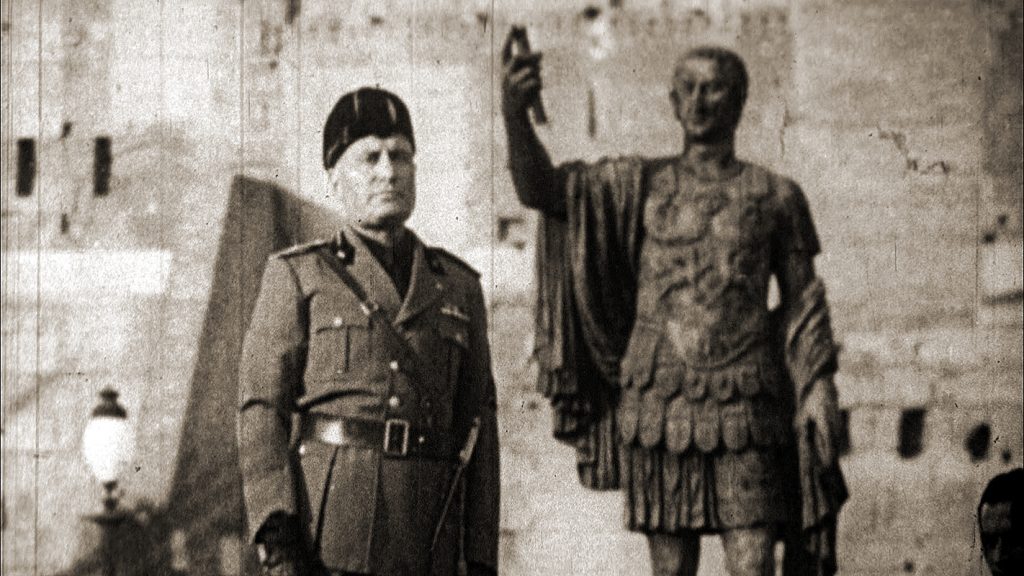
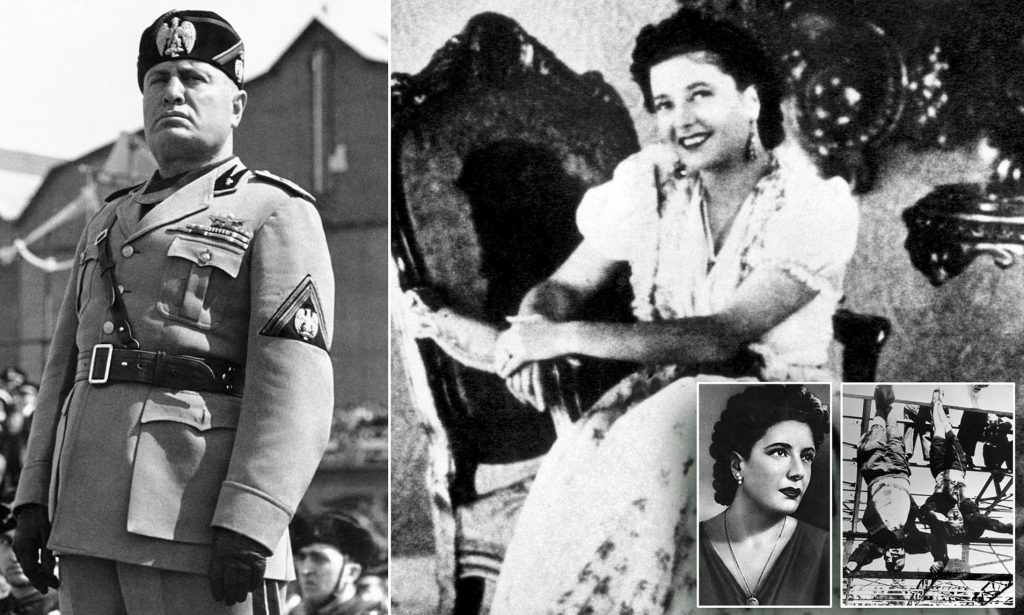

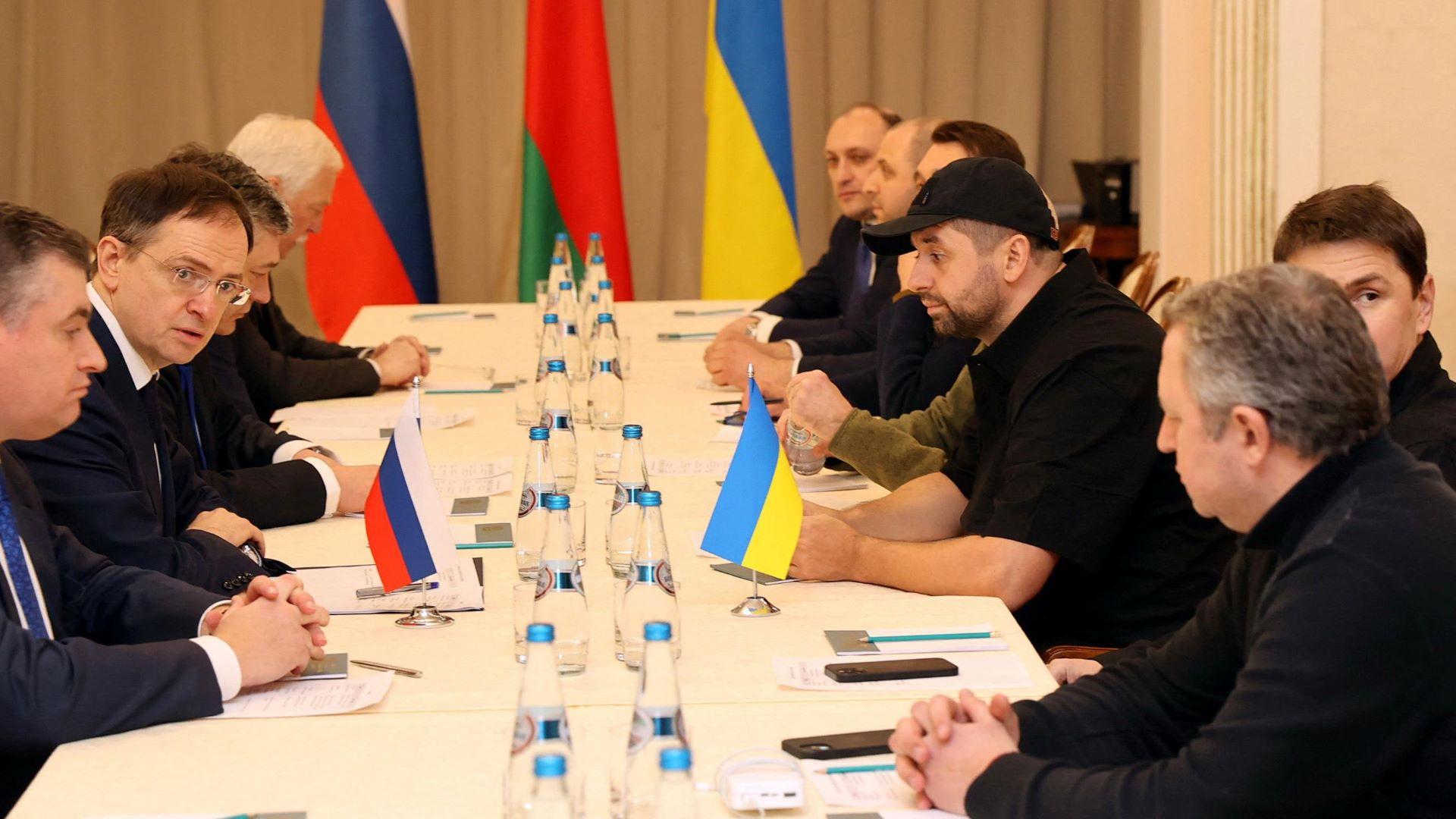
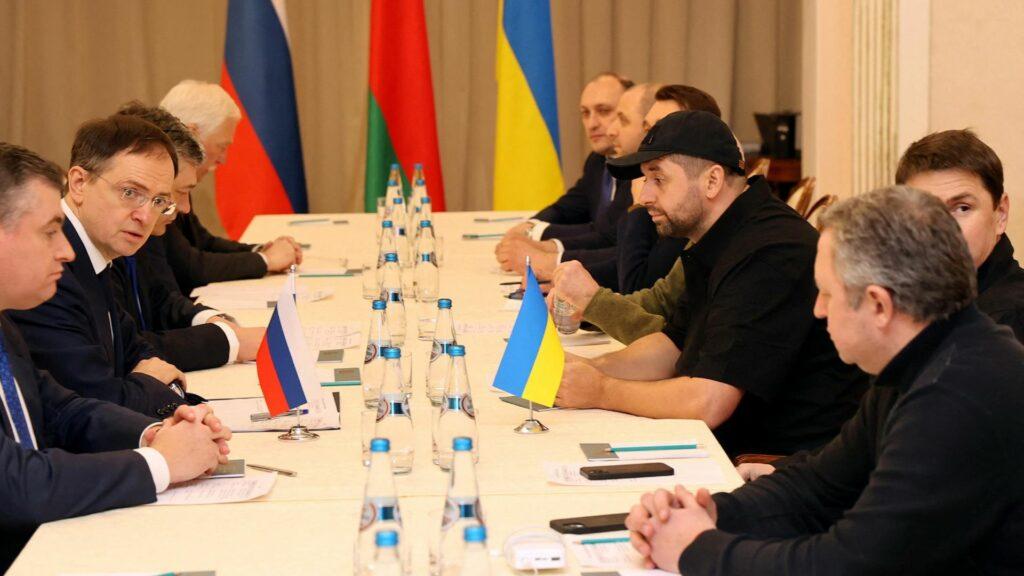 Faisant écho à l’interview de Vladimir Poutine par Tucker Carlson, dans laquelle il se disait ouvert à de nouvelles négociations
Faisant écho à l’interview de Vladimir Poutine par Tucker Carlson, dans laquelle il se disait ouvert à de nouvelles négociations
L’article Les termes secrets des négociations de 2022 entre l’Ukraine et la Russie est apparu en premier sur STRATPOL.
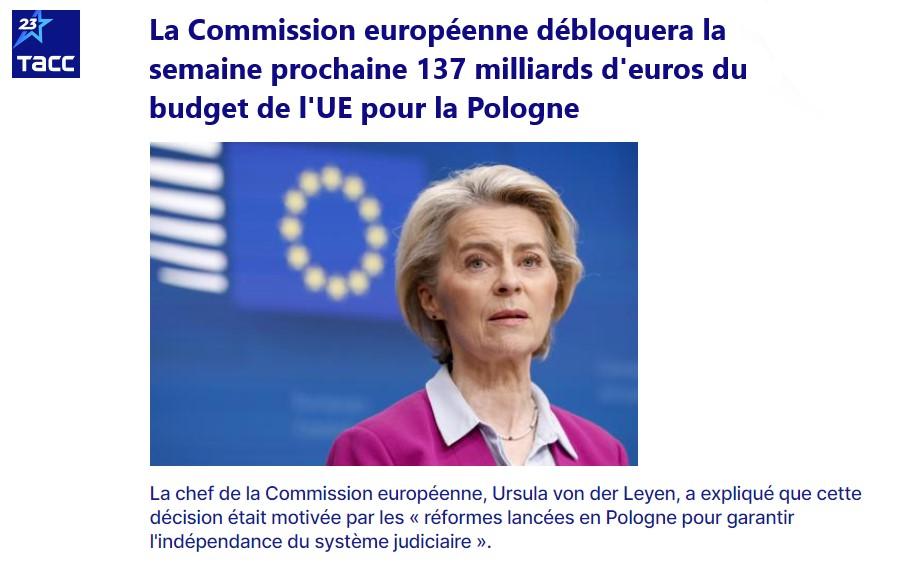
 La Commission européenne décidera la semaine prochaine de l’allocation de 137 milliards d’euros du budget de l’Union européenne à la
La Commission européenne décidera la semaine prochaine de l’allocation de 137 milliards d’euros du budget de l’Union européenne à la
L’article La Commission européenne débloque 137 milliards d’euros pour la Pologne pour ses “réformes” est apparu en premier sur STRATPOL.
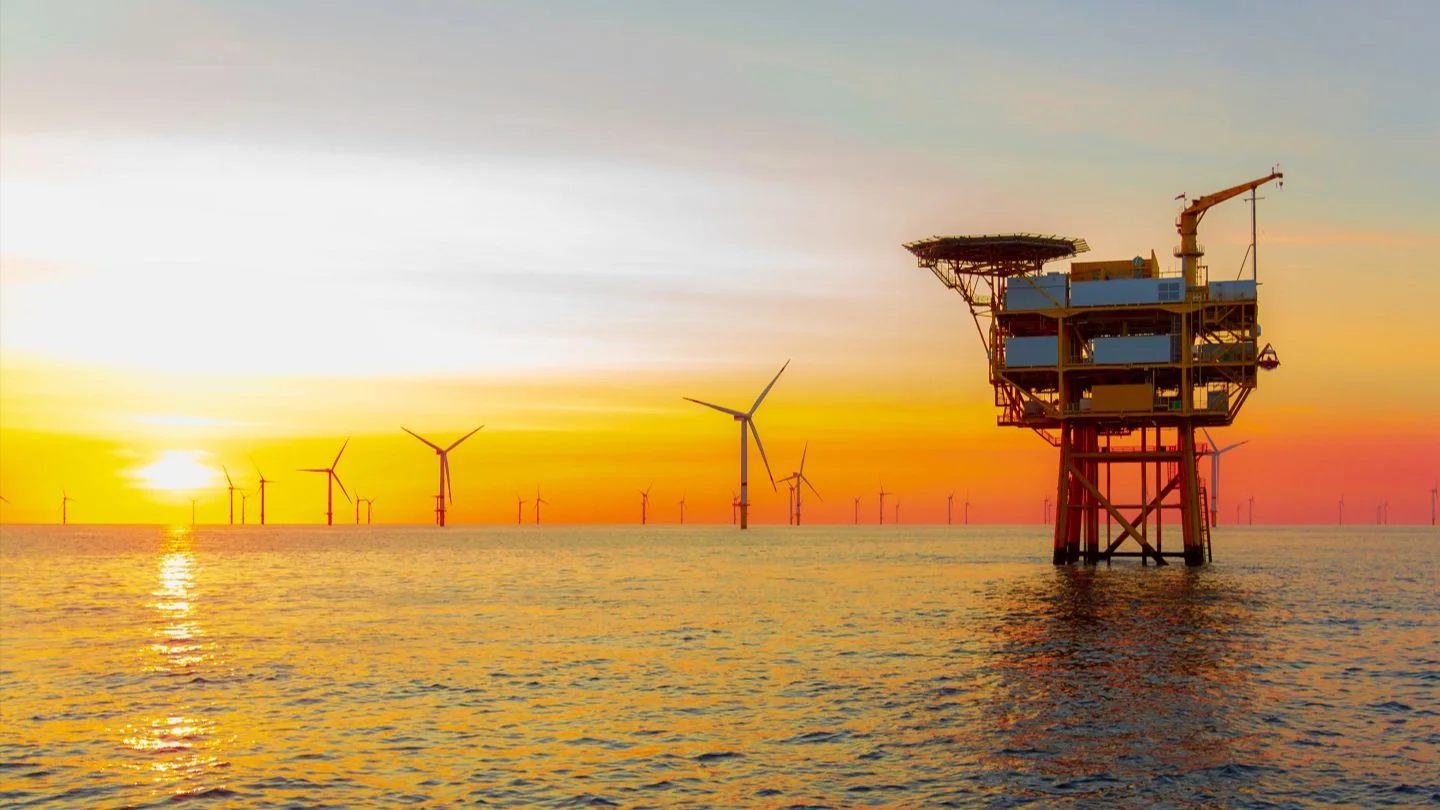
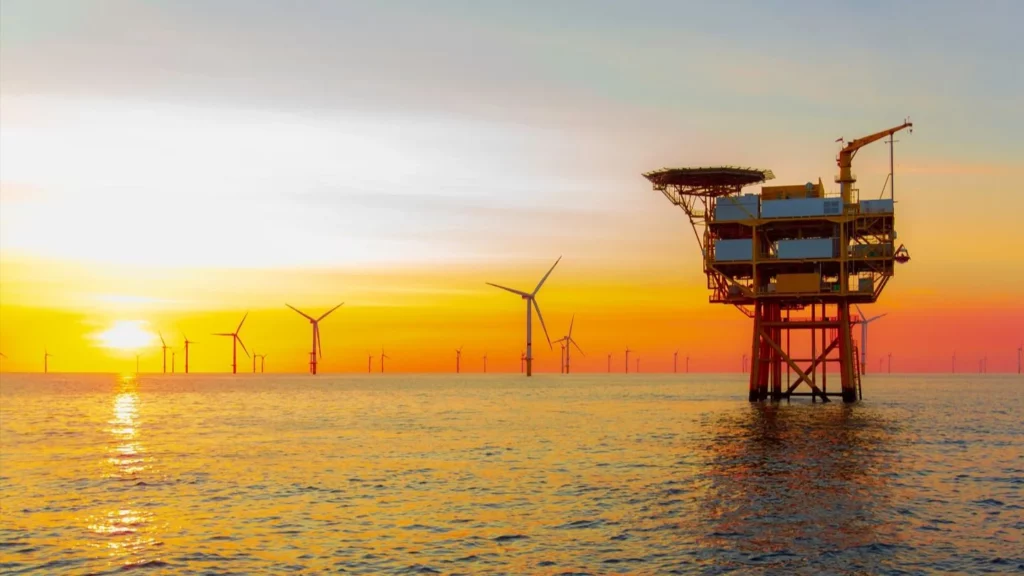 En 2005, alors en formation d’ingénieur, je suis parti au Danemark pour faire mon stage de fin d’étude à l’Ambassade
En 2005, alors en formation d’ingénieur, je suis parti au Danemark pour faire mon stage de fin d’étude à l’Ambassade
L’article Transition énergétique: l’exemple emblématique du Danemark est apparu en premier sur STRATPOL.
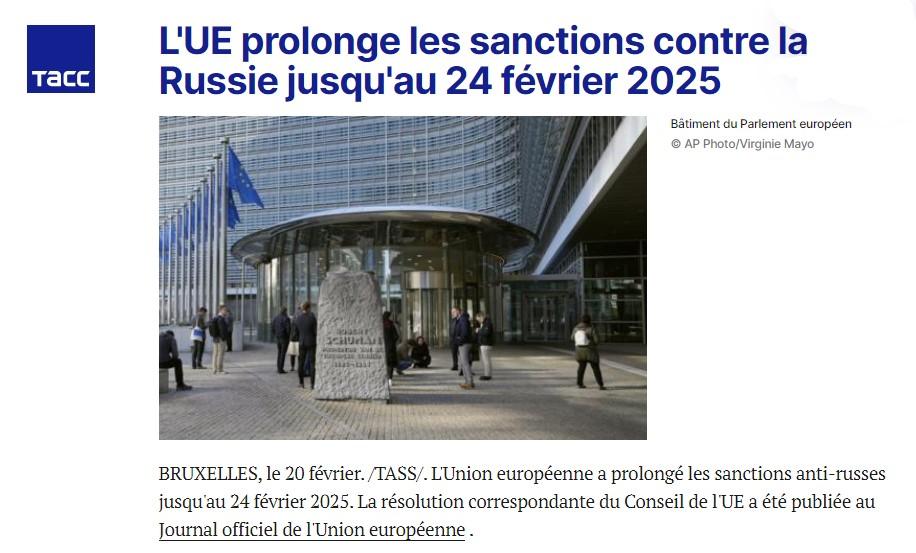
 L’Union européenne a prolongé les sanctions antirusses jusqu’au 24 février 2025. La résolution correspondante du Conseil de l’UE a été
L’Union européenne a prolongé les sanctions antirusses jusqu’au 24 février 2025. La résolution correspondante du Conseil de l’UE a été
L’article L’UE prolonge ses sanctions antirusses jusqu’en février 2025 est apparu en premier sur STRATPOL.
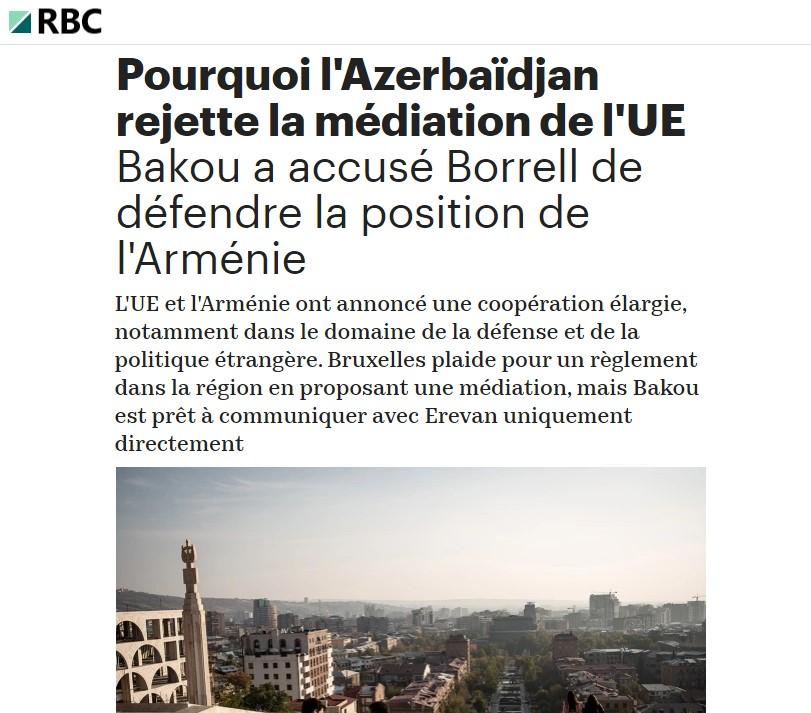
 Le 14 février, le ministère azerbaïdjanais des Affaires étrangères a publié une déclaration dans laquelle il accuse le haut représentant
Le 14 février, le ministère azerbaïdjanais des Affaires étrangères a publié une déclaration dans laquelle il accuse le haut représentant
L’article L’Azerbaïdjan accuse l’UE d’être pro-arménienne et refuse sa médiation est apparu en premier sur STRATPOL.
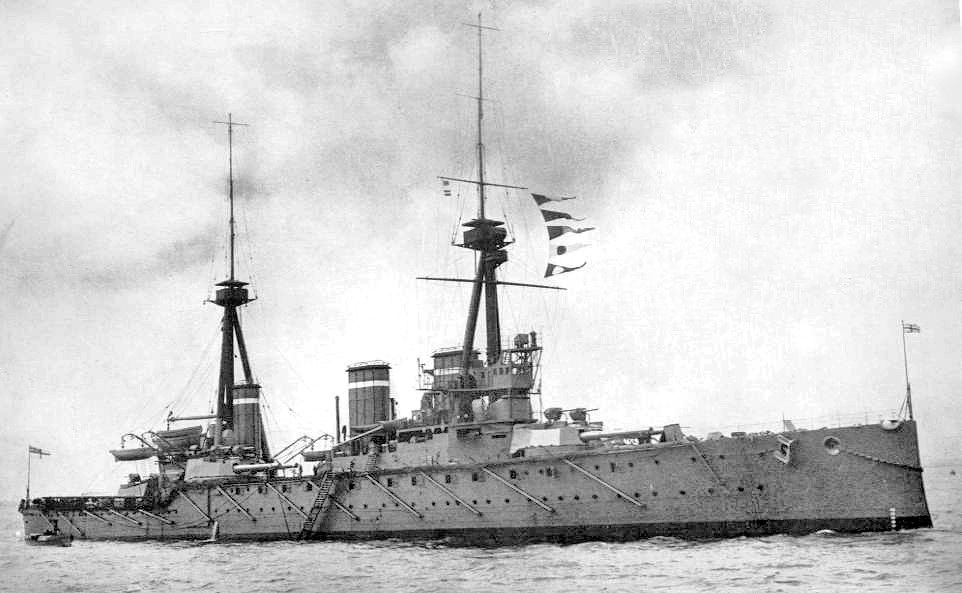
 Dès les premières semaines de la première guerre mondiale, sur toutes les mers du globe et sous les deux hémisphères,
Dès les premières semaines de la première guerre mondiale, sur toutes les mers du globe et sous les deux hémisphères,
L’article 1914 : La Grande Bretagne efface l’Allemagne sur tous les océans du monde est apparu en premier sur STRATPOL.
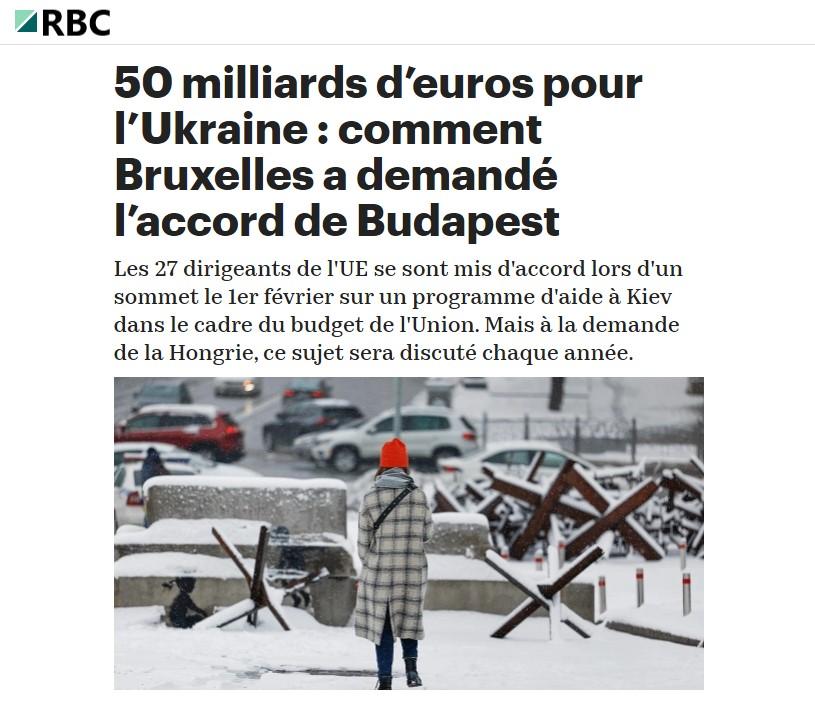
 Les 27 dirigeants de l’UE se sont mis d’accord lors d’un sommet le 1er février sur un programme d’aide à
Les 27 dirigeants de l’UE se sont mis d’accord lors d’un sommet le 1er février sur un programme d’aide à
L’article L’UE s’accorde finalement sur l’aide de 50 milliards à l’Ukraine est apparu en premier sur STRATPOL.
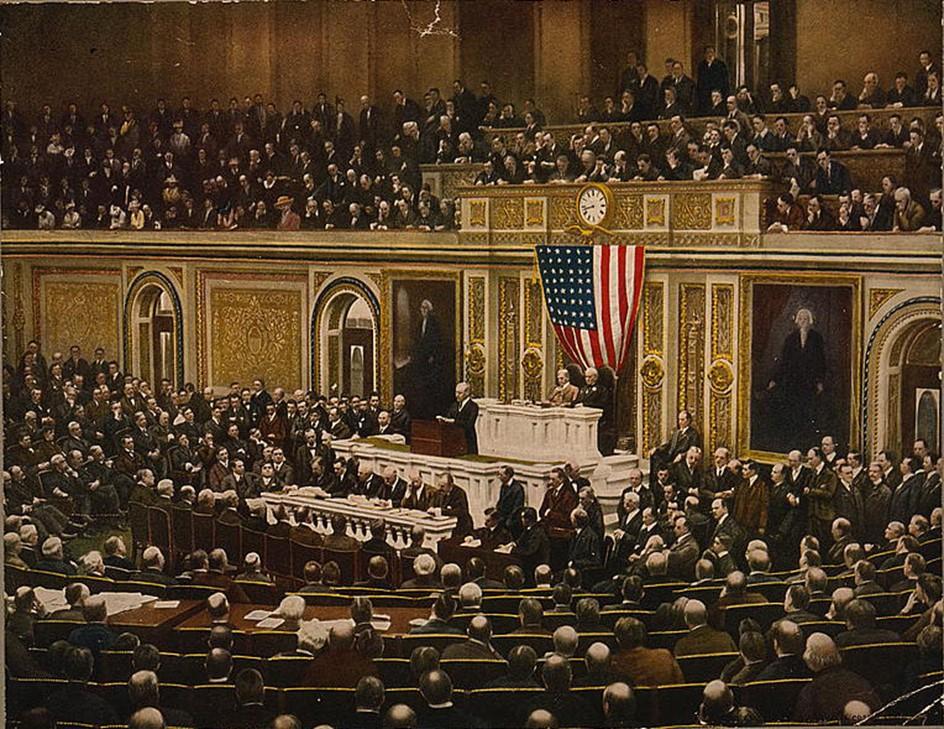
 31 mai 1916… Britannia, la fille préférée de Neptune… Aux derniers jours de mai 1916, en mer du Nord un
31 mai 1916… Britannia, la fille préférée de Neptune… Aux derniers jours de mai 1916, en mer du Nord un
L’article 6 avril 1917, le jour où l’Amérique entra en guerre est apparu en premier sur STRATPOL.
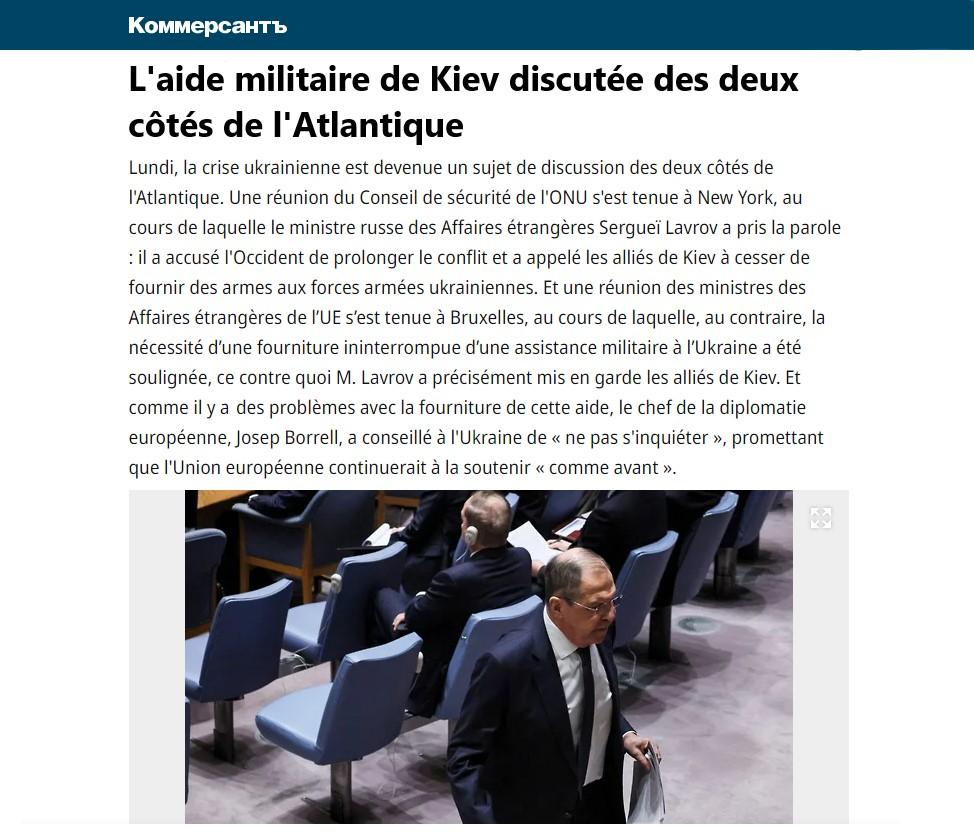
 Lundi, la crise ukrainienne est devenue un sujet de discussion des deux côtés de l’Atlantique. Une réunion du Conseil de
Lundi, la crise ukrainienne est devenue un sujet de discussion des deux côtés de l’Atlantique. Une réunion du Conseil de
L’article Lavrov au Conseil de sécurité de l’Onu pendant que l’UE décide de prolonger indéfiniment son aide militaire à Kiev est apparu en premier sur STRATPOL.
An excellent primer on who protects and nurtures ISIS and assorted “our good USUK terrorists” in the huge porous Syria-Iraq-KSA-Jordan desert.
The desperate beleaguered Empire (1) activates them against the Resistance Axis, and in response, (2) the Iraqi Resistance relentlessly and incrementally attrites the US bases in precisely this lawless four-state region populated by the compradore desert bedouins. These Salafi highwaymen and brigands would have long ceased to matter or be more than a nuisance (their traditional regional role for 10 millennia) if it were not for the US armed forces, who openly defend them and instrumentalize them on command.
PS — as noted, in addition to squatting and stealing Syrian oil/water/breadbasket to impoverish and to prevent rebuilding and development, the western armies (chiefly US and French bases) serve as placeholders for the rise of Erez Israel (Greater Unholy Israel, from the Nile to the Euphrates). As with gas off Gaza, they front the economic red cape, but it has ever been Eschatological, about defense of western Judeo-Christian Zionism. For this last project of the combined West, they sacrifice everything, including their reputation and posterity..

Al Tanf US base is located in the bottom lime-green half-circle, at the junction of Syria, Iraq, and Jordan — the traditional land trade route between Iraq and Syria, and located within the Great Syrian Desert. This region is home to the inter-related desert bedouin tribes of the four Sykes-Picot created states, the imperial pool of proxies..


Another unsaid objective is to sever China’s Silk Road. This ancient caravan route passed by Al Tanf and Palmyra on its way to Damascus and the Eastern Mediterranean. This informs China’s defense of Syria and the Resistance to unblock intolerable obstacles built by Zio-USUK.
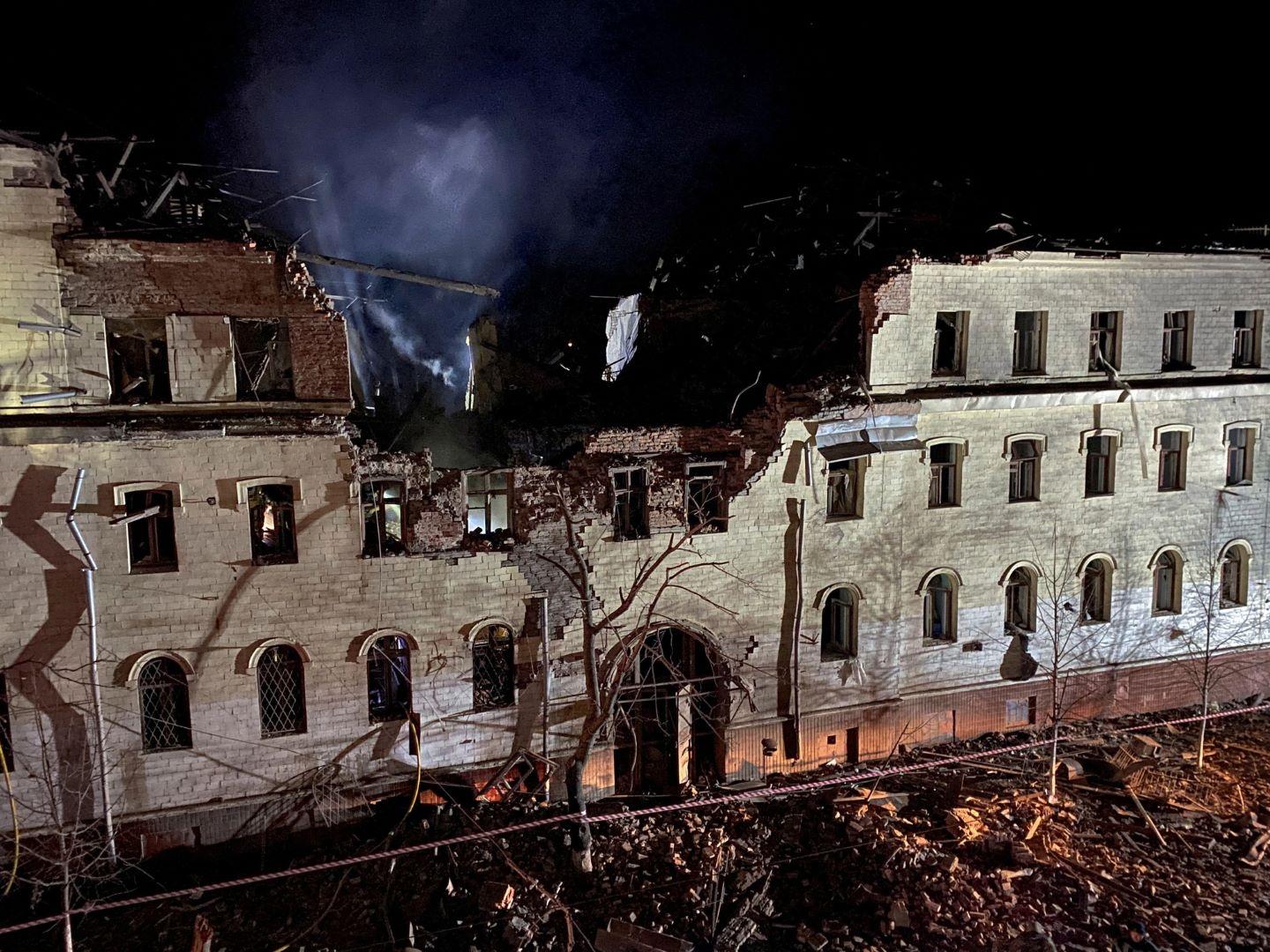
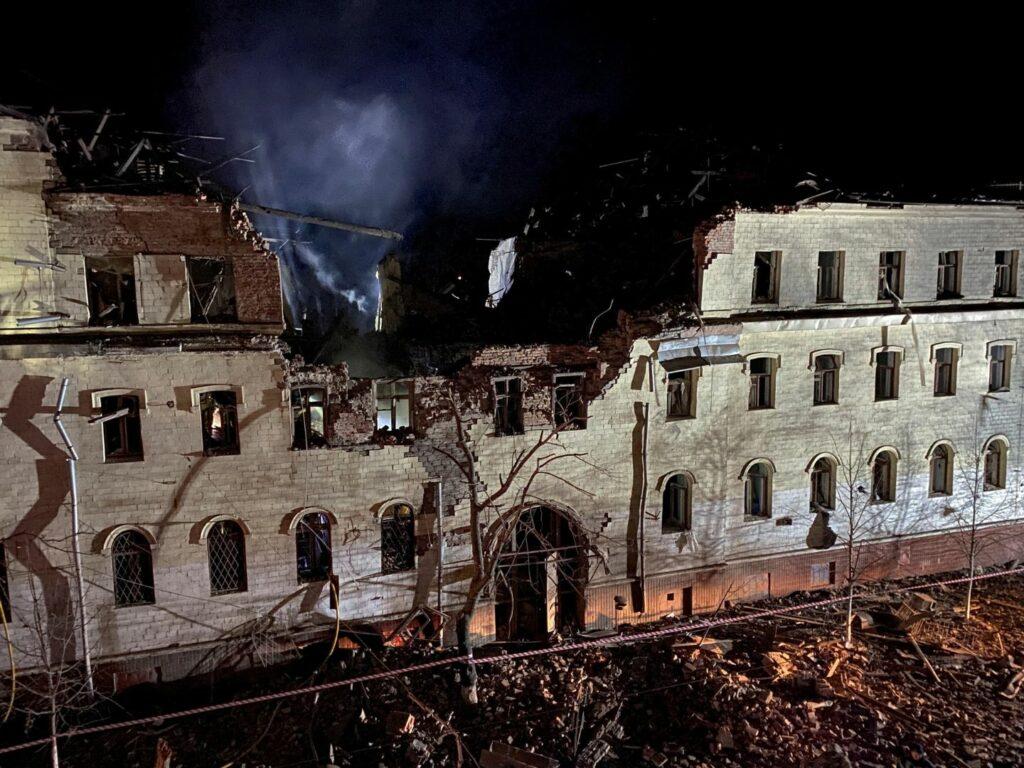 Caroline Galacteros, docteur en sciences politiques, directrice du centre d’analyse GEOPRAGMA, a livré son analyse sur l’élimination de 60 mercenaires
Caroline Galacteros, docteur en sciences politiques, directrice du centre d’analyse GEOPRAGMA, a livré son analyse sur l’élimination de 60 mercenaires
L’article Le gouvernement français peut être considéré comme moralement responsable de ce qui s’est passé à Kharkov est apparu en premier sur STRATPOL.
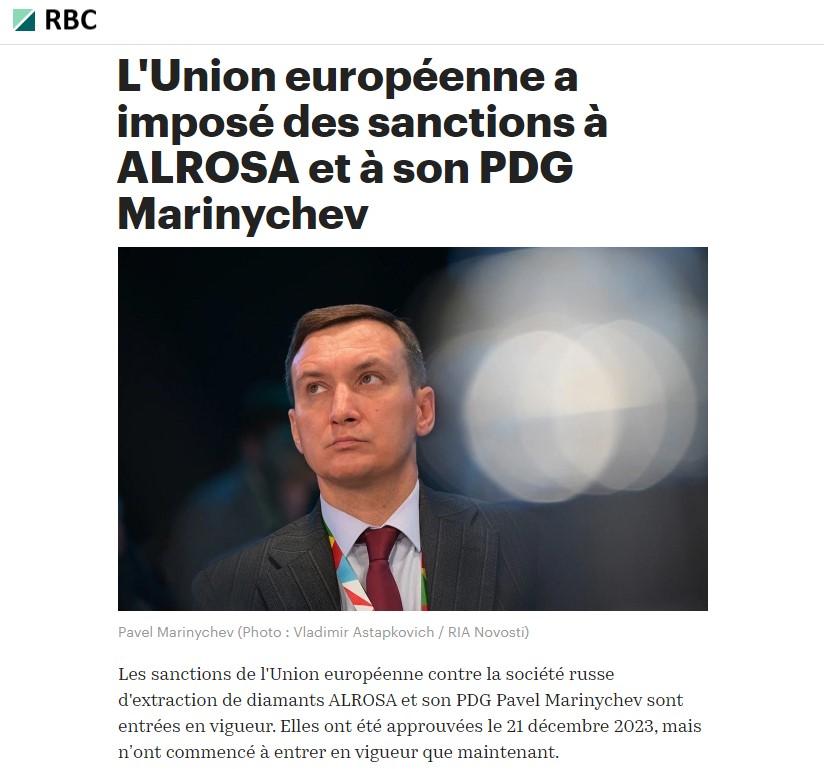
 Les sanctions de l’Union européenne contre la société russe d’extraction de diamants ALROSA et son PDG Pavel Marinychev sont entrées
Les sanctions de l’Union européenne contre la société russe d’extraction de diamants ALROSA et son PDG Pavel Marinychev sont entrées
L’article Les sanctions contre les diamants russes ALROSA sont entrées en vigueur est apparu en premier sur STRATPOL.
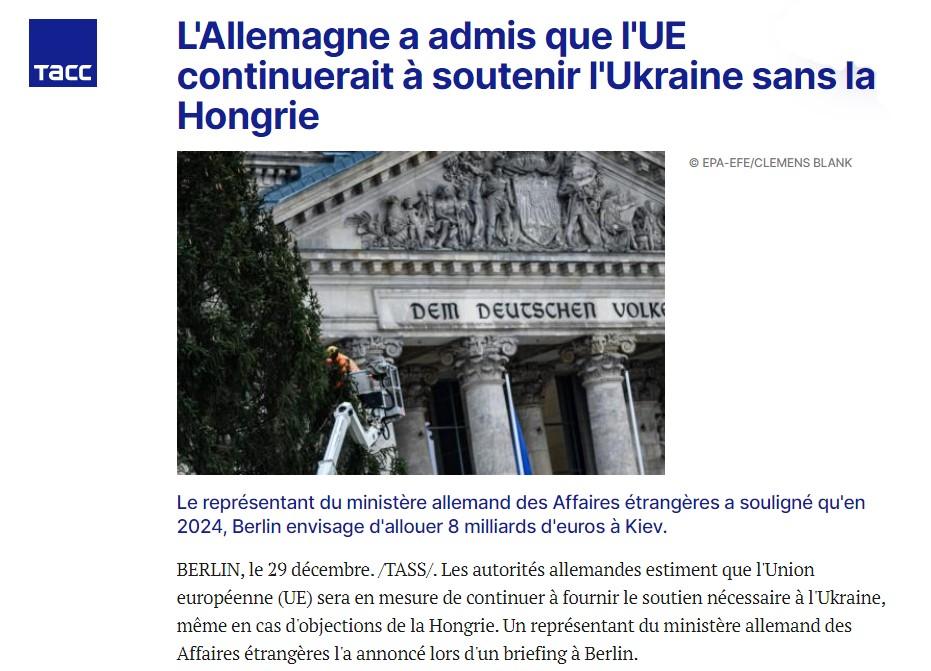
 Les autorités allemandes estiment que l’Union européenne (UE) sera en mesure de continuer à fournir le soutien nécessaire à l’Ukraine,
Les autorités allemandes estiment que l’Union européenne (UE) sera en mesure de continuer à fournir le soutien nécessaire à l’Ukraine,
L’article L’Allemagne estime que l’UE continuera d’aider Kiev même si la Hongrie s’y oppose est apparu en premier sur STRATPOL.
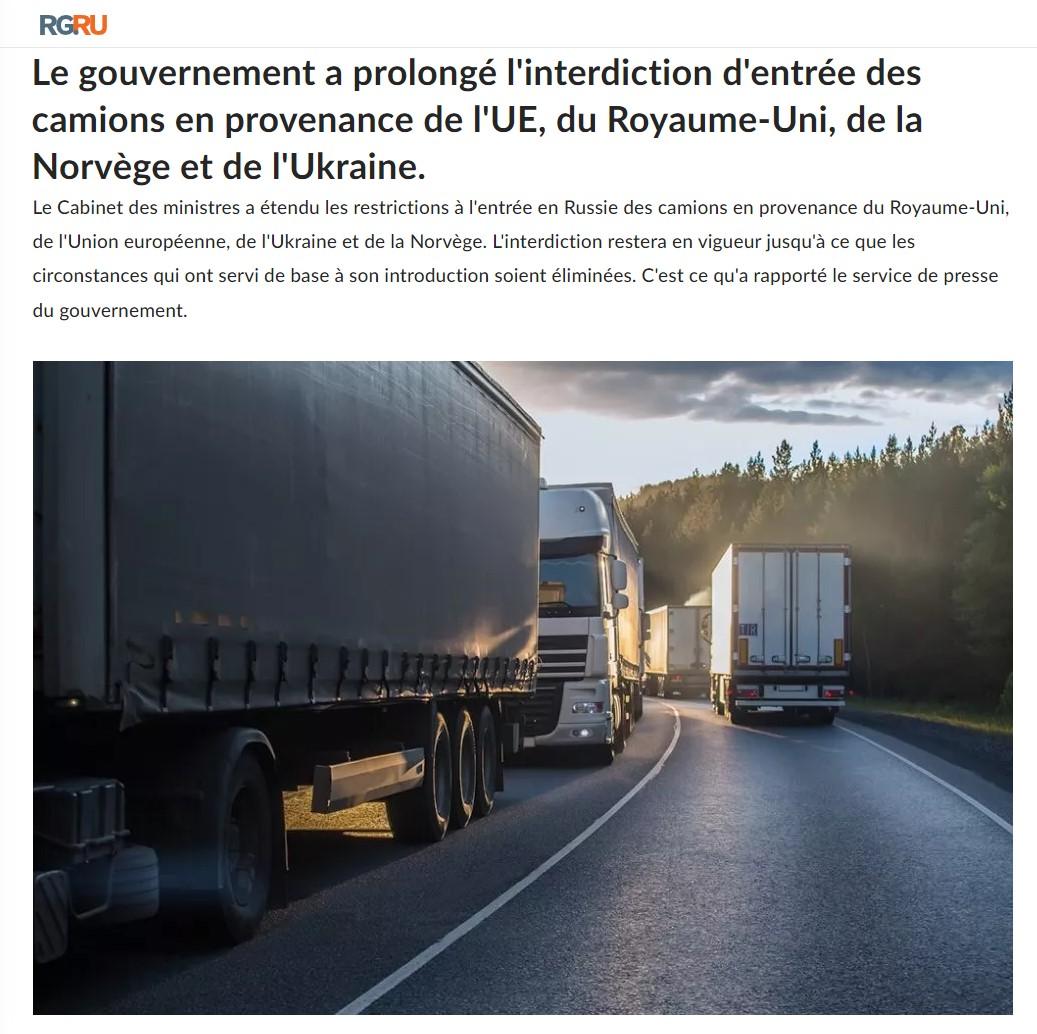
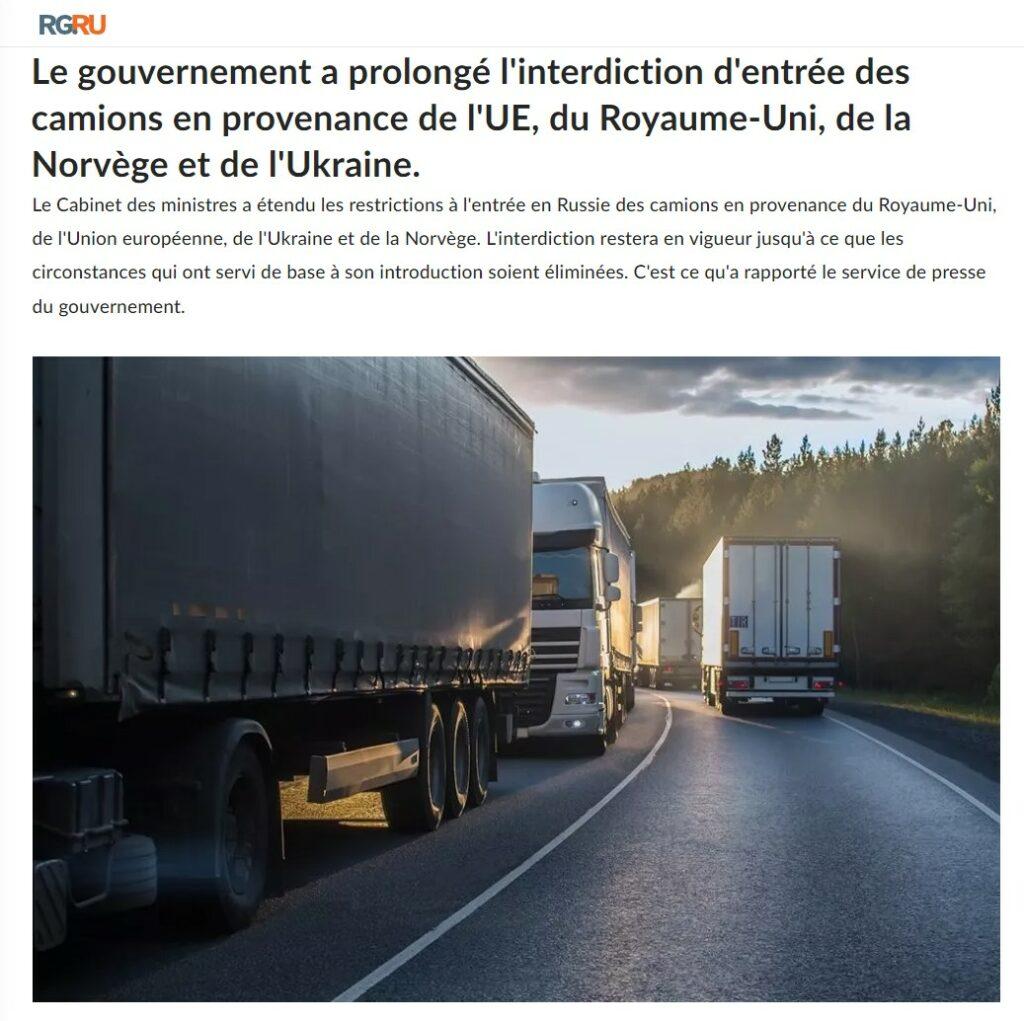 Le Cabinet des ministres a étendu les restrictions à l’entrée en Russie des camions en provenance du Royaume-Uni, de l’Union
Le Cabinet des ministres a étendu les restrictions à l’entrée en Russie des camions en provenance du Royaume-Uni, de l’Union
L’article Le gouvernement russe prolonge l’interdiction d’entrée des poids lourds pour les Européens est apparu en premier sur STRATPOL.
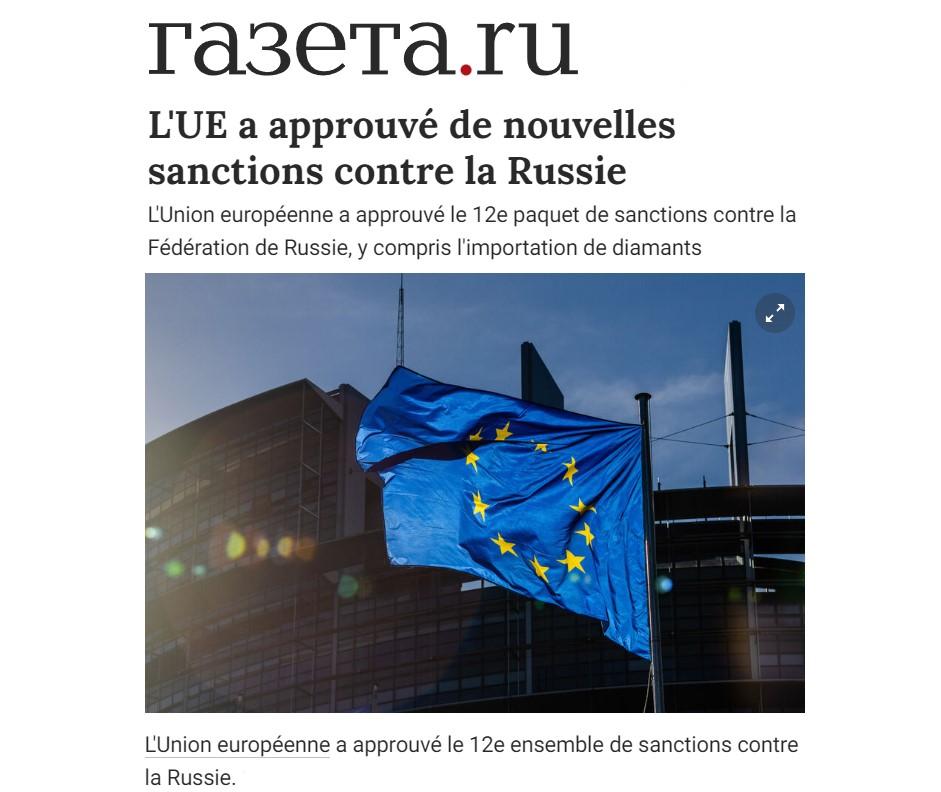
 À partir du 1er janvier, l’UE limitera l’importation de diamants non industriels extraits, transformés ou produits en Russie. Et à
À partir du 1er janvier, l’UE limitera l’importation de diamants non industriels extraits, transformés ou produits en Russie. Et à
L’article L’UE adopte son 12e paquet de sanctions contre la Russie est apparu en premier sur STRATPOL.
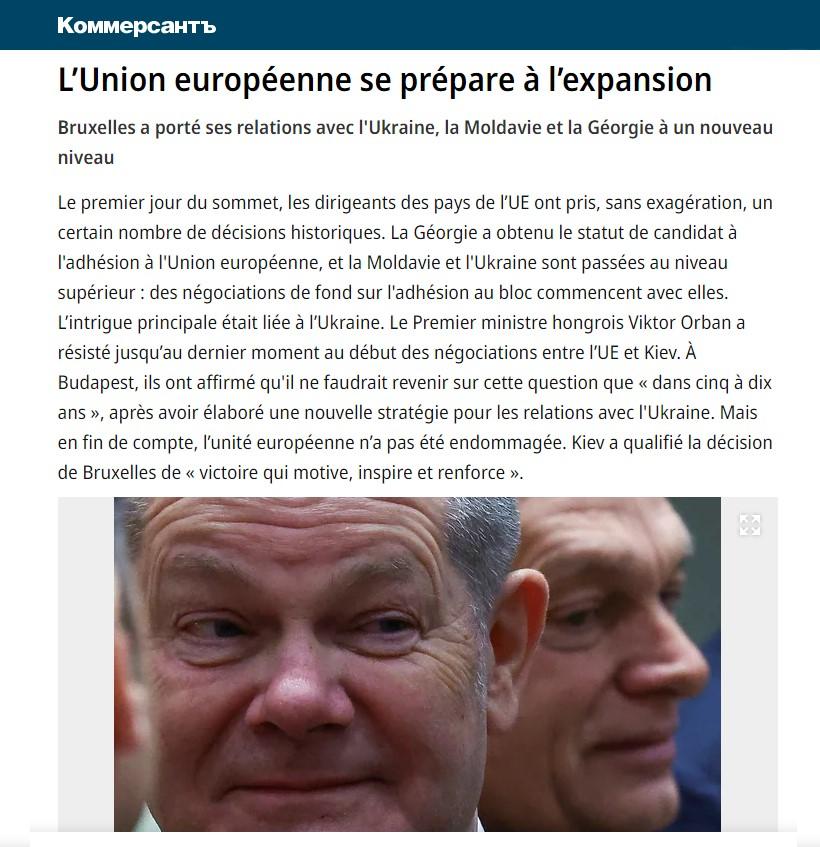
 Le premier jour du sommet, les dirigeants des pays de l’UE ont pris, sans exagération, un certain nombre de décisions
Le premier jour du sommet, les dirigeants des pays de l’UE ont pris, sans exagération, un certain nombre de décisions
L’article L’UE donne le statut de candidat à la Géorgie, à la Moldavie et à l’Ukraine est apparu en premier sur STRATPOL.
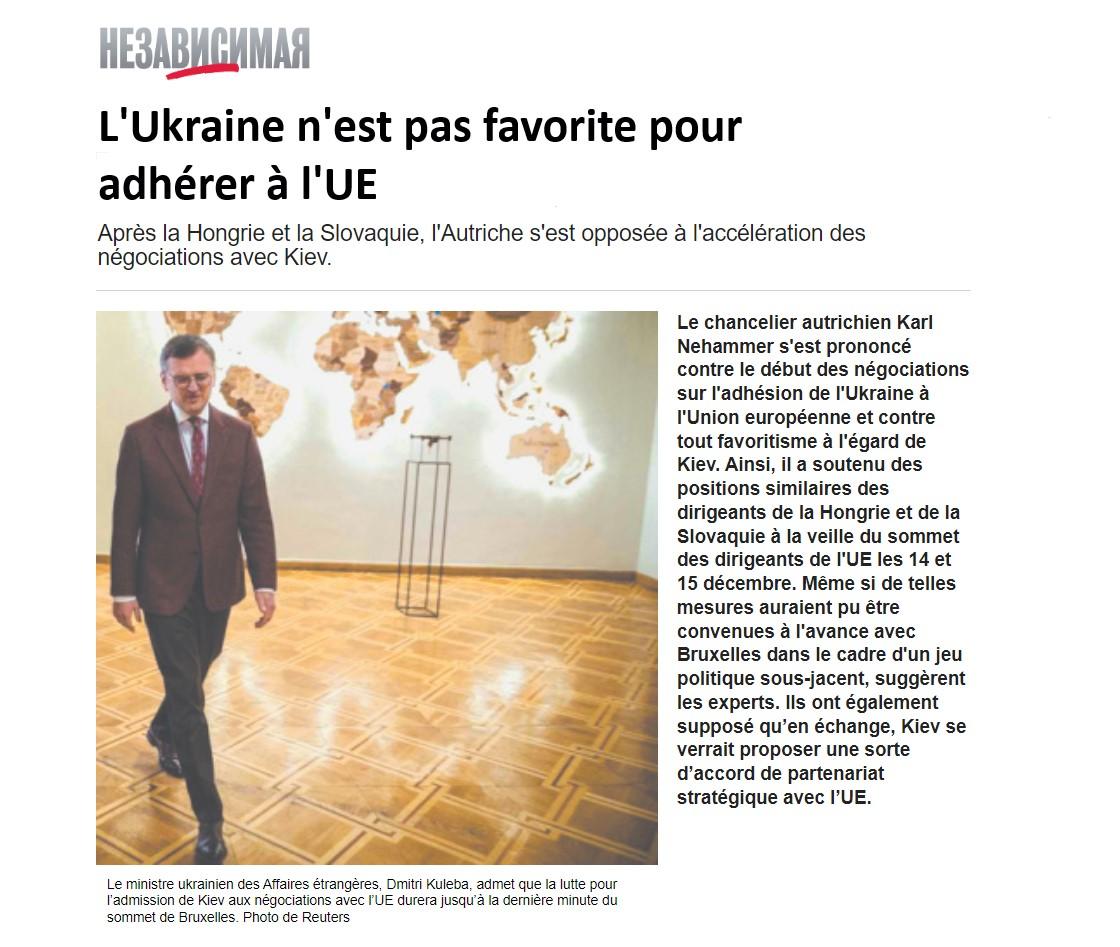
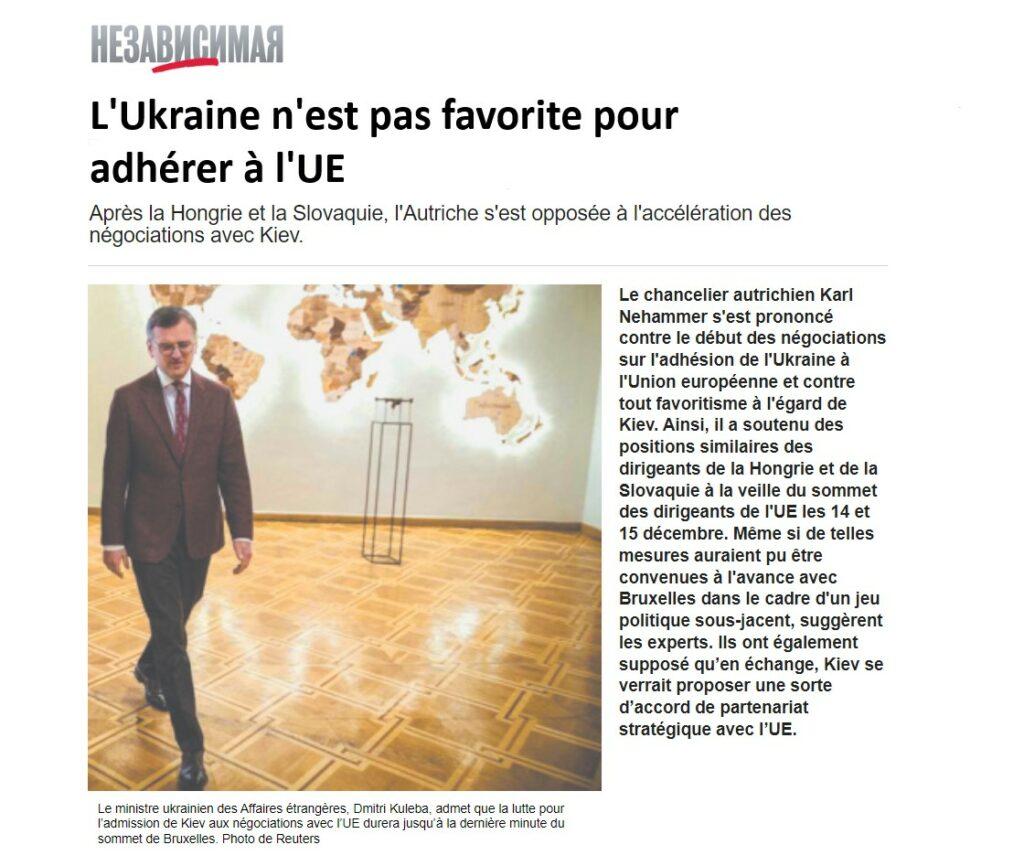 Le chancelier autrichien Karl Nehammer s’est prononcé contre le début des négociations sur l’adhésion de l’Ukraine à l’Union européenne et
Le chancelier autrichien Karl Nehammer s’est prononcé contre le début des négociations sur l’adhésion de l’Ukraine à l’Union européenne et
L’article Après la Hongrie et la Slovaquie, l’Autriche s’oppose aussi au début des négociations sur l’adhésion de l’Ukraine à l’UE est apparu en premier sur STRATPOL.
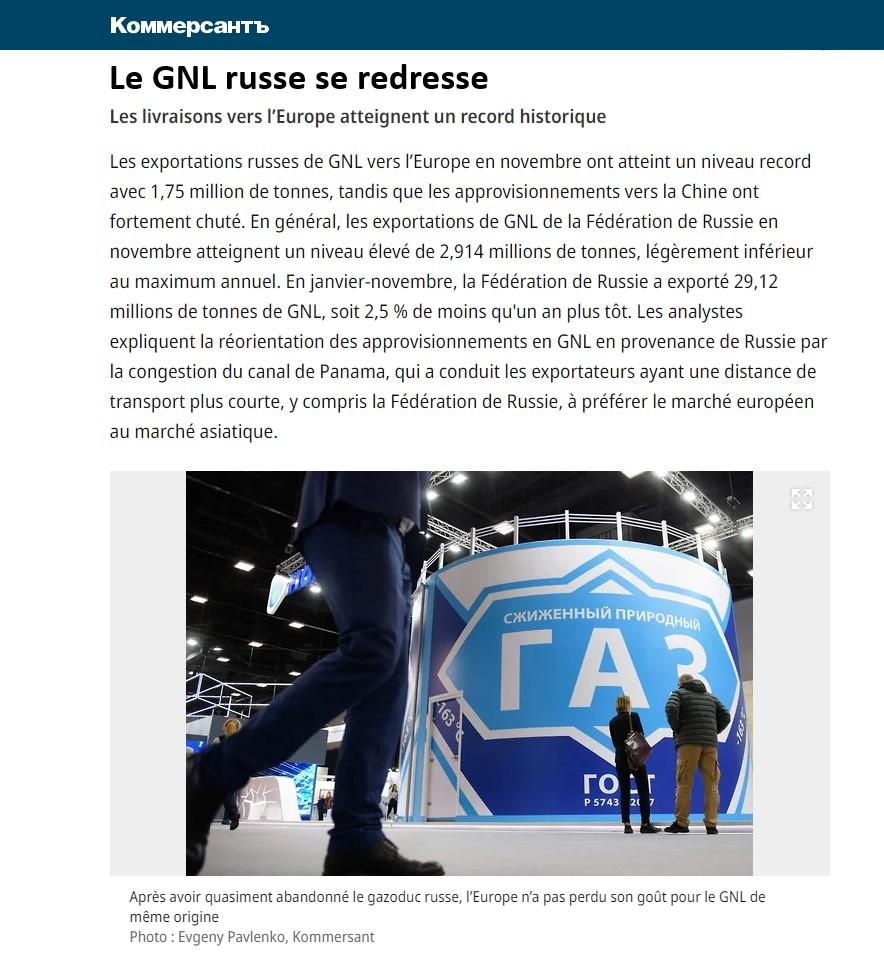
 Les exportations russes de GNL vers l’Europe en novembre ont atteint un niveau record avec 1,75 million de tonnes, tandis
Les exportations russes de GNL vers l’Europe en novembre ont atteint un niveau record avec 1,75 million de tonnes, tandis
L’article Le GNL russe se redresse et l’Europe continue d’en réclamer est apparu en premier sur STRATPOL.
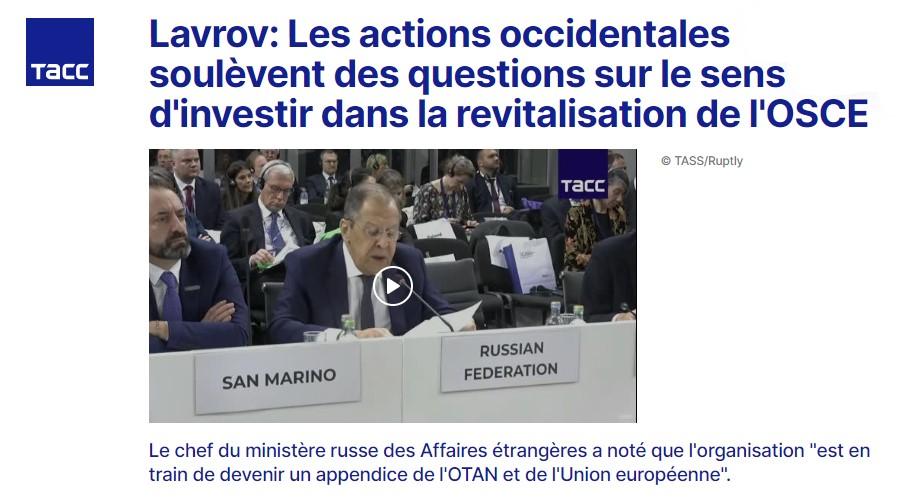
 Les actions de l’Occident soulèvent la question de savoir s’il est judicieux d’investir dans la revitalisation de l’Organisation pour la
Les actions de l’Occident soulèvent la question de savoir s’il est judicieux d’investir dans la revitalisation de l’Organisation pour la
L’article Lavrov constate que l’OSCE est “sur le point de disparaître” est apparu en premier sur STRATPOL.
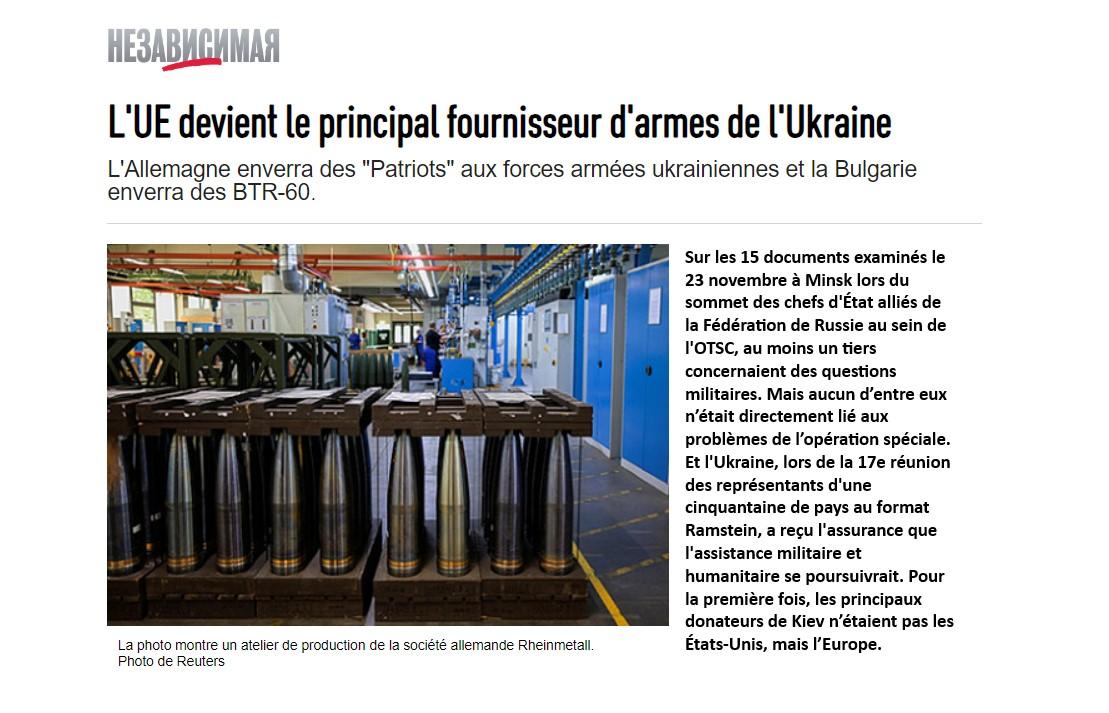
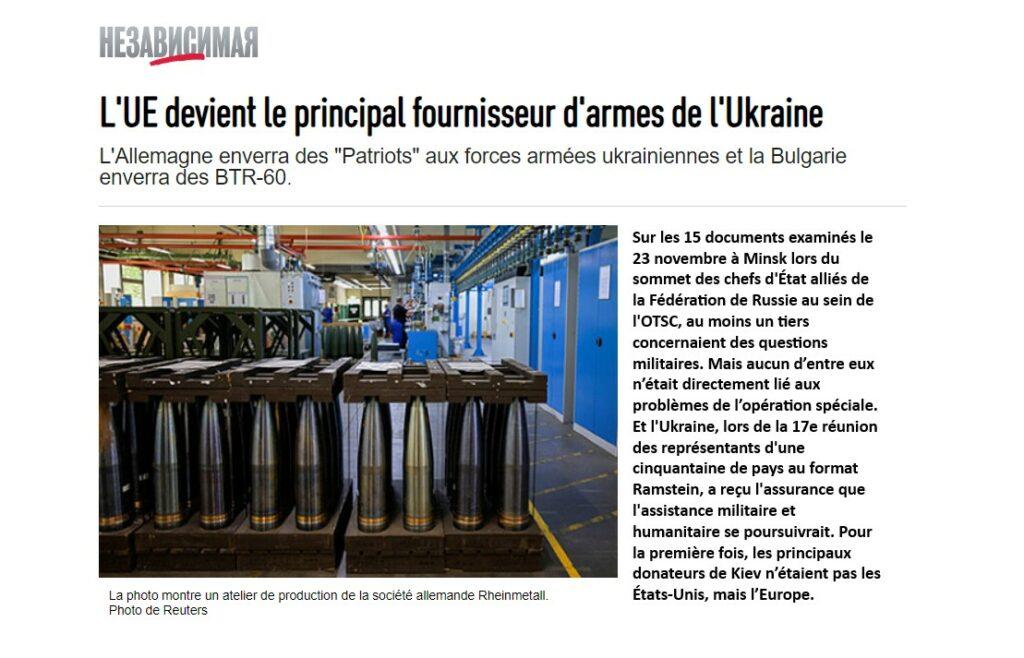 Sur les 15 documents examinés le 23 novembre à Minsk lors du sommet des chefs d’État alliés de la Fédération
Sur les 15 documents examinés le 23 novembre à Minsk lors du sommet des chefs d’État alliés de la Fédération
L’article L’UE devient le principal fournisseur d’armes pour l’Ukraine est apparu en premier sur STRATPOL.
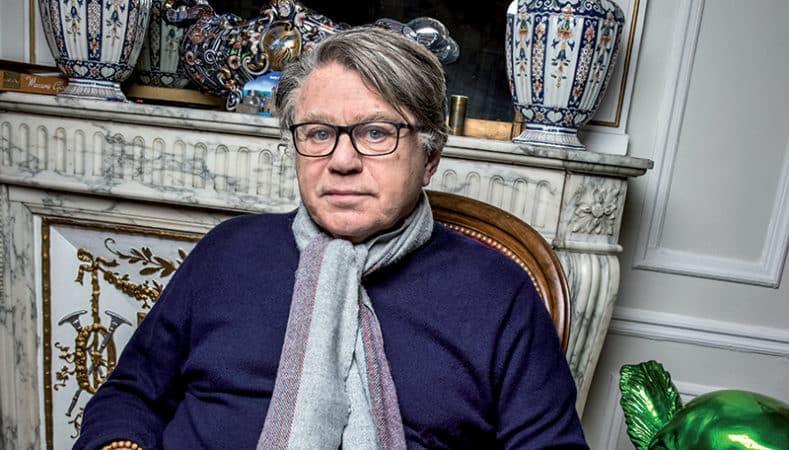
 Gilbert Collard est un homme politique français, député au Parlement européen. L’un des dirigeants du parti «Reconquête» a parlé du
Gilbert Collard est un homme politique français, député au Parlement européen. L’un des dirigeants du parti «Reconquête» a parlé du
L’article Les sanctions anti-russes ne frappent que l’Europe. Vous pouvez comprendre les intérêts des États-Unis dans la guerre en Ukraine, mais ni la France ni l’UE n’en ont. est apparu en premier sur STRATPOL.
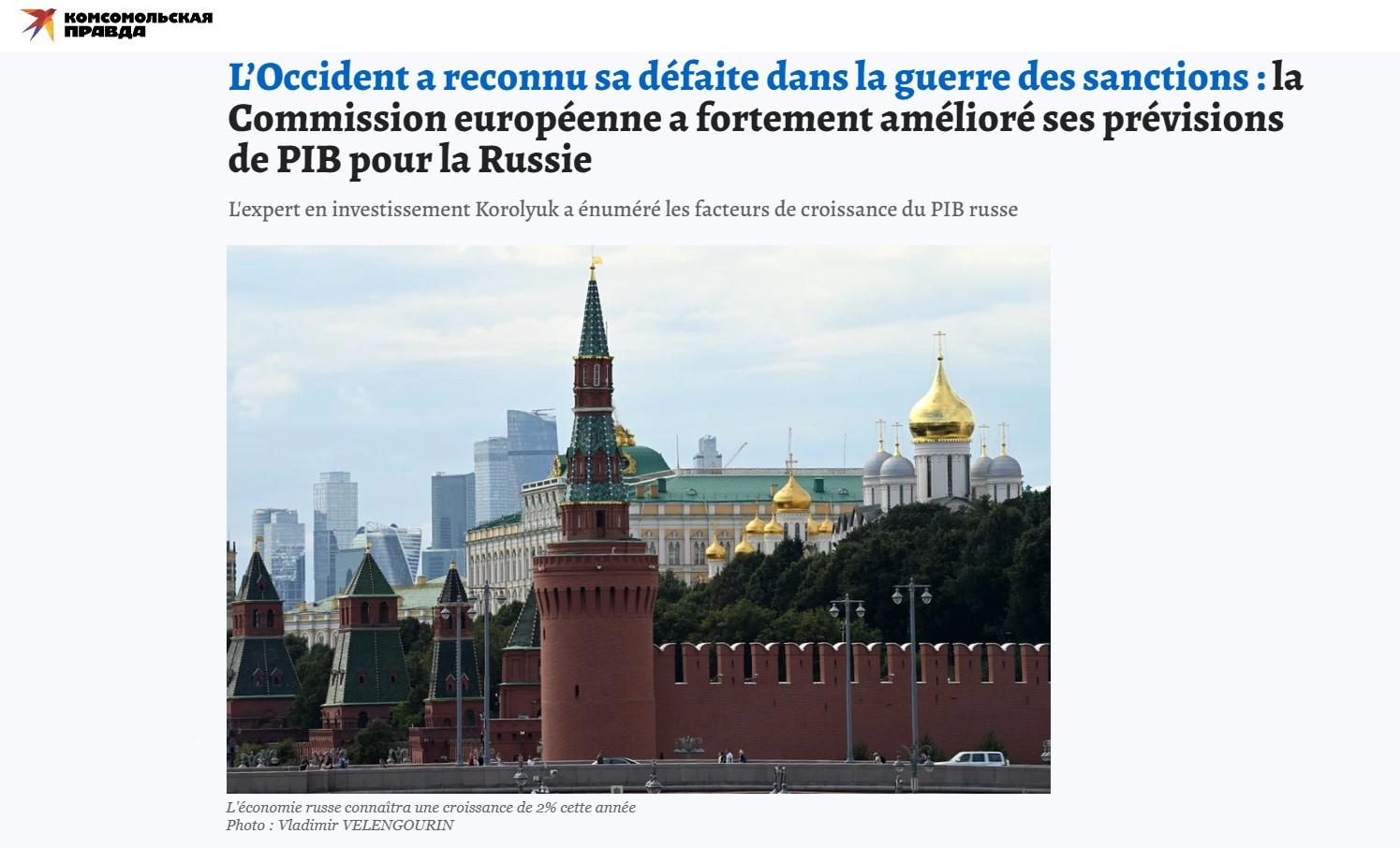
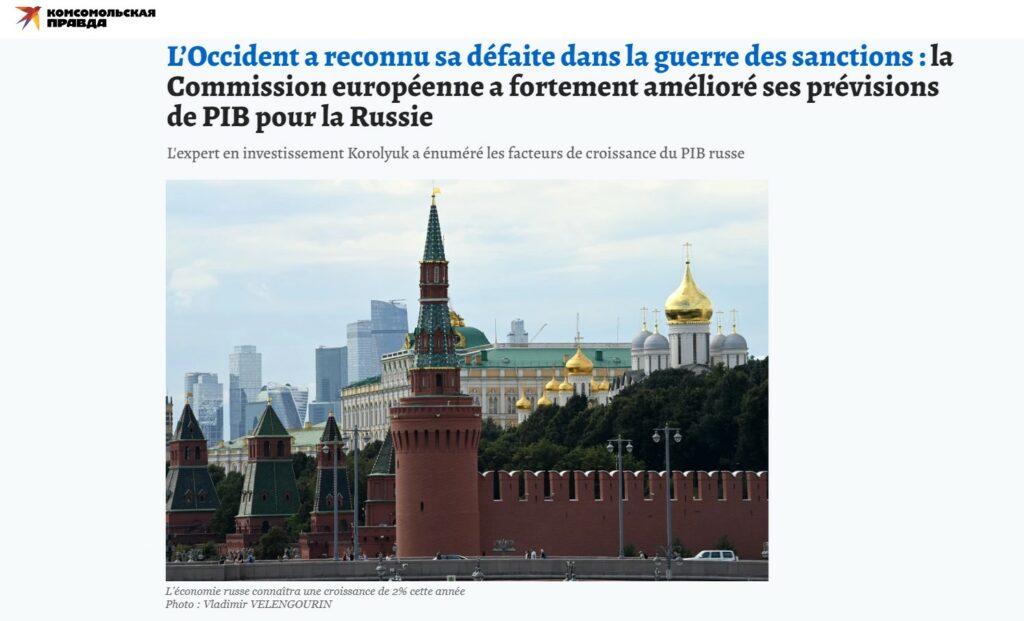 La Commission européenne a considérablement amélioré ses prévisions concernant le PIB de la Russie en 2023. Ceci est indiqué dans
La Commission européenne a considérablement amélioré ses prévisions concernant le PIB de la Russie en 2023. Ceci est indiqué dans
L’article La Commission européenne change complètement ses prévisions de croissance du PIB russe pour 2023 est apparu en premier sur STRATPOL.
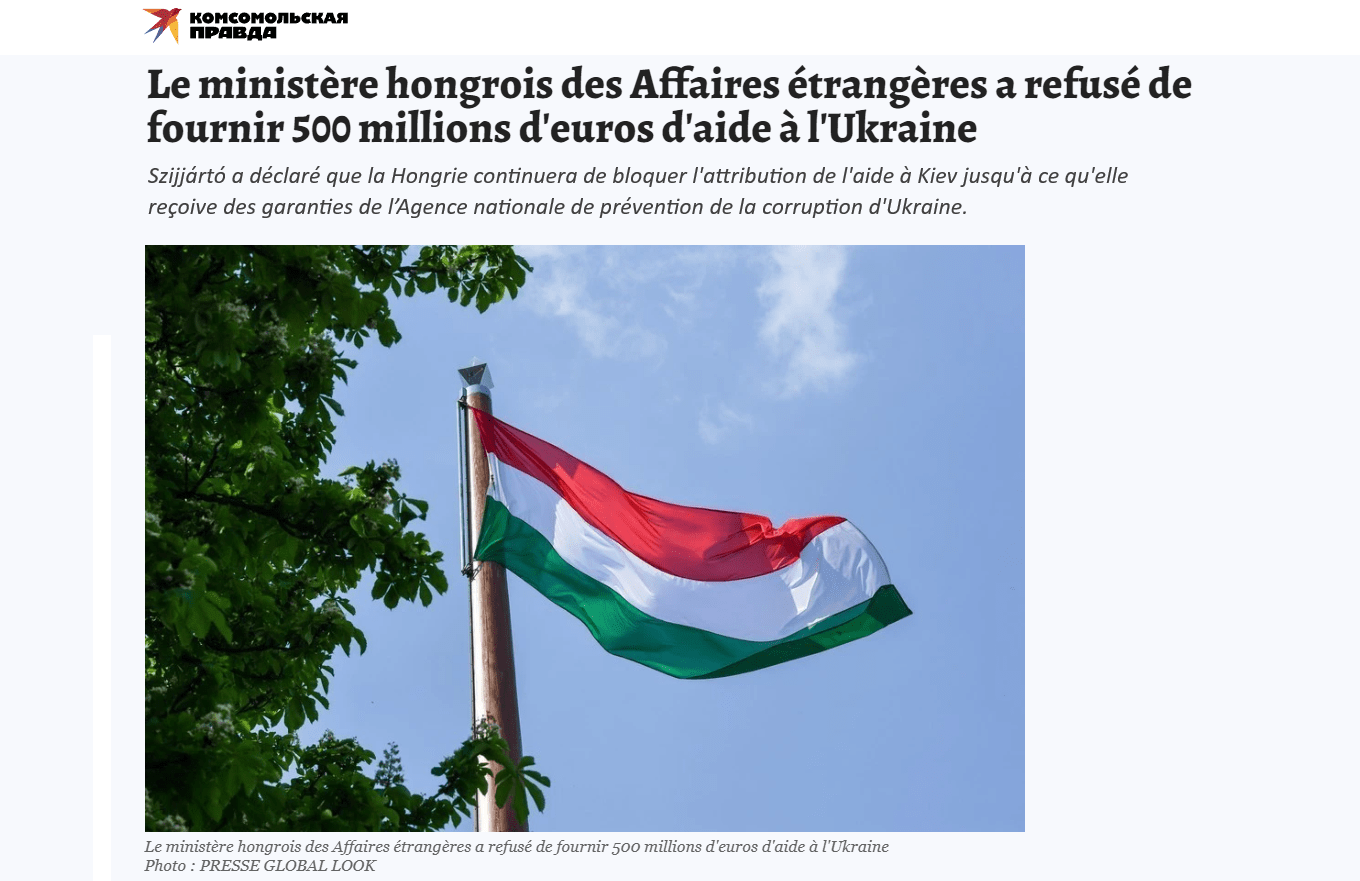
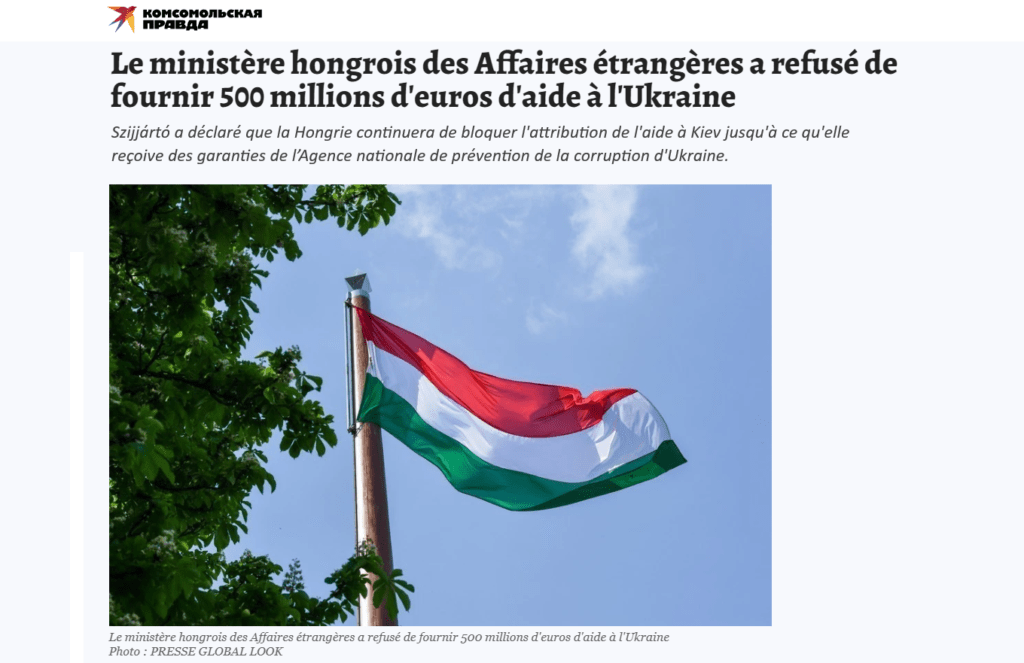 Le ministre hongrois des Affaires étrangères Peter Szijjártó a déclaré que Budapest n’allouerait pas 500 millions d’euros du Fonds européen
Le ministre hongrois des Affaires étrangères Peter Szijjártó a déclaré que Budapest n’allouerait pas 500 millions d’euros du Fonds européen
L’article La Hongrie refuse l’allocation de 500 millions d’euros du Fonds européen pour la paix à l’Ukraine est apparu en premier sur STRATPOL.